#Lace Weaving Machine
Explore tagged Tumblr posts
Text
Introduction to the Working Principle and Advantages of Lace Weaving Machine

A type of spinning machine called a lace weaving machine is used to weave lace. It can weave different types of fibers in a predetermined pattern to give the items a decorative lace aspect. The invention of the lace weaving machine has greatly advanced the textile sector by simplifying, increasing the effectiveness, and bringing down the cost of producing textile goods. Are you prepared to transform the way you weave? You need look no farther than Weavetech, your go-to partner for expertise in weaving and innovation. Our cutting-edge weaving equipment is made to improve your productivity and craftsmanship.
The Working Principle of Lace Weaving Machine
The way a lace weaving machine works is that you feed fiber cloth into it, and it will weave it into lace faster and in accordance with a predetermined pattern. Software programs the lace weaving machine’s pattern, which can be altered at any time to suit the needs of the client. The output of textile products may be substantially increased by using a lace weaving machine, which can weave with great precision, produce a range of lace effects, and weave lace that is more delicate and natural. It can also save a significant amount of labor costs. The lace weaving machine also boasts excellent durability, a long operating lifespan that is safe and dependable, and low power consumption that has no negative effects on the quality of textile goods.
The Advantages Of Lace Weaving Machine
Because of its many benefits, the lace weaving machine is becoming more and more popular. It is a high-efficiency weaving tool that can handle the demands of embroidery and floral weaving. Get in touch with Weavetech if you’re searching for the top textile machine manufacturer in India; we offer the most energy-efficient twisting and weaving solutions.
First of all, lace weaving machines weave extremely quickly and can reach higher production efficiency levels than conventional floral and embroidery machines. It can significantly increase production efficiency because pattern weaving just requires a shorter cycle time to finish.
Second, there are energy-saving benefits to lace weaving machines. This can minimize energy consumption and save a significant amount of money on energy expenditures because it doesn’t use as much electricity to run as standard flower and embroidery machines.
The benefits of the lace weaving machine also include fabric solidity and puncture force. The force used by the weaving machine to pierce the fabric and insert the thread into it, giving the fabric greater solidity, is referred to as the puncture force. Additionally, the lace weaving machine offers the benefit of cost savings. It can significantly reduce manufacturing costs because it uses fewer consumables than traditional flower and embroidery machines, which utilize a lot of them.
The benefits of a lace weaving machine are clear, to put it briefly. It can reduce production costs, increase fabric solidity and puncture force, conserve energy, and increase production efficiency. As a result, an increasing number of businesses are turning to lace weaving machines to fulfill their demands for floral and embroidery weaving.
Potential issues during the warping and weaving process can be reduced and the final woven fabric’s quality and consistency can be enhanced by carefully choosing the best kind of warping and weaving process, according to instructions, and using premium yarns and weaving machines. You may get the most cutting-edge and energy-efficient twisting and weaving solutions from Alidhra Weavetech. We are a worldwide company with over 20 years of experience providing locally made weaving and twisting machines solutions worldwide.
This blog originally posted here:
https://www.weavetech.com/introduction-to-the-working-principle-and-advantages-of-lace-weaving-machine/
#manufacturing#textile machine#cutting-edge machinery#textile machinery manufacturer in Gujarat#Lace Weaving Machine
0 notes
Text
.☽༊˚ a hundred assorted prompts
¹⁾ raspberry lip gloss
²⁾ pajama bottoms
³⁾ a silver lighter
⁴⁾ fresh honey
⁵⁾ flushed cheeks
⁶⁾ a fogged-up mirror
⁷⁾ the imprint of a belt buckle on skin
⁸⁾ helium balloons
⁹⁾ a broken cocktail glass
¹⁰⁾ old playing cards
¹¹⁾ chipped green nail polish
¹²⁾ a brown leather wallet
¹³⁾ bullet holes in a wooden wall
¹⁴⁾ seashells lined up along the curve of a spine
¹⁵⁾ beaded curtains
¹⁶⁾ pomegranate seeds
¹⁷⁾ a carabiner heavy with keys
¹⁸⁾ fresh-cut orchids in a pottery vase
¹⁹⁾ vending machine cigarettes
²⁰⁾ an out of date map
²¹⁾ a creaky wooden gate
²²⁾ a minifridge stocked with budweiser and paracetamol
²³⁾ snapdragons growing between pavement slabs
²⁴⁾ smudged yellow eyeshadow
²⁵⁾ slept-in braids
²⁶⁾ library books that’ll never be returned
²⁷⁾ a pink-tiled shower
²⁸⁾ a honeybee on a linen shirtsleeve
²⁹⁾ burnt popcorn
³⁰⁾ watching an eclipse from bed
³¹⁾ a black lace bralette
³²⁾ a tattered patchwork quilt
³³⁾ blue raspberry bubblegum
³⁴⁾ a rusted fishing rod and a dried-up lake
³⁶⁾ the taste of whiskey on someone else’s lips
³⁷⁾ rose-scented candles burned down to the wick
³⁸⁾ crescent-shaped coffee stains on a wooden tabletop
³⁹⁾ odd socks
⁴⁰⁾ a loose thread on a jumper sleeve
⁴¹⁾ warm sheets on cold skin
⁴²⁾ amber-tinged perfume
⁴³⁾ gold jewelry
⁴⁴⁾ a calloused palm against a soft cheek
⁴⁵⁾ a busted headlight
⁴⁶⁾ sunrise from a jail cell
⁴⁷⁾ hand tattoos that weave around fingers
⁴⁸⁾ coconut shampoo
⁴⁹⁾ a doorbell sounding in the middle of the night
⁵⁰⁾ ladybugs crawling across a headstone
⁵¹⁾ grass stains on blue jeans
⁵²⁾ a loaded saddlebag
⁵³⁾ a dusty wine cellar
⁵⁴⁾ a bikini top draped over a bedpost
⁵⁵⁾ snow in july
⁵⁶⁾ dirt-red mountaintops
⁵⁷⁾ goosebumps in a heatwave
⁵⁸⁾ an empty dinnertable
⁵⁹⁾ a fresh manicure and bruised knuckles
⁶⁰⁾ zombie movies
⁶¹⁾ bitten lips
⁶²⁾ dark eyes full of tears
⁶³⁾ a soft cast in summertime
⁶⁴⁾ stale coffee in paper cups
⁶⁵⁾ frozen peaches on a black eye
⁶⁶⁾ acrid smoke
⁶⁷⁾ bound hands
⁶⁸⁾ animal tracks
⁶⁹⁾ unwound vhs tapes
⁷⁰⁾ cartoon plasters
⁷¹⁾ lipstick marks on shirt collars
⁷²⁾ silver bangles
⁷³⁾ sharing a coat in a downpour
⁷⁴⁾ fields with grass at waist-height
⁷⁵⁾ daisy chains up to your forearm
⁷⁶⁾ rolled-up shirtsleeves
⁷⁷⁾ the smell of bleach in a dark room
⁷⁸⁾ a shared sleeping bag
⁷⁹⁾ a new haircut
⁸⁰⁾ swimsuit tanlines
⁸¹⁾ perfume clinging to a pillow
⁸²⁾ lollipops dangling between lips
⁸³⁾ a badly-timed grin
⁸⁴⁾ old books
⁸⁵⁾ tongues stained from slushies
⁸⁶⁾ waking up in a hailstorm
⁸⁷⁾ dying sunflowers
⁸⁸⁾ colourful sunglasses
⁸⁹⁾ the last pew
⁹⁰⁾ tall, rattling windows in a storm
⁹¹⁾ six missed calls
⁹²⁾ sticks of incense burned down to the last
⁹³⁾ bunk beds
⁹⁴⁾ matching sets
⁹⁵⁾ ruined mascara
⁹⁶⁾ a boxing ring
⁹⁷⁾ stained glass windows
⁹⁸⁾ fairy forts
⁹⁹⁾ a cluttered bedside table
¹⁰⁰⁾ a hangover in the evening
#i can’t even try and explain where this came from lad#prompts#prompt list#writing prompts#writing exercise#rp meme#otp prompts#imagine your otp#otp writing#fic prompts#drabble prompts#aesthetic prompts#soft prompts#random prompts
803 notes
·
View notes
Text
Sewing 1890s Day Dress in Doll Scale
I went slightly overboard with this second historical doll project. Here's my first one. The style is from around 1897 and more of a middle class style. As with my first doll outfit, I tried to stick to historical methods as much as possible, but the scale forced me to do some deviations. I hand-sew everything though sewing machine was already widely used, because in this scale it's easier to control the stitch, there's not that much to sew anyway and also I just really like hand-sewing. Here's all the items I made. As said, I went a little overboard. One thing that's missing is the corset cover, but the layers of fabric were creating enough bulk on the waist as is so I decided to not make one.

This time I decided to try repainting the face. I don't have any doll customization materials, so I used acrylics. After couple of attempts I got decent results. Acrylics can't make as smooth and delicate finish as pastels, pencils and gouache, which can be used on vinyl with basing sprays, and I'm not experienced with painting small details on 3D objects, so it's a bit smudged at points, especially with the other eye. I aimed for 1890s very neutral make up and the type of expression that was popular in fashion plates and other illustrations.
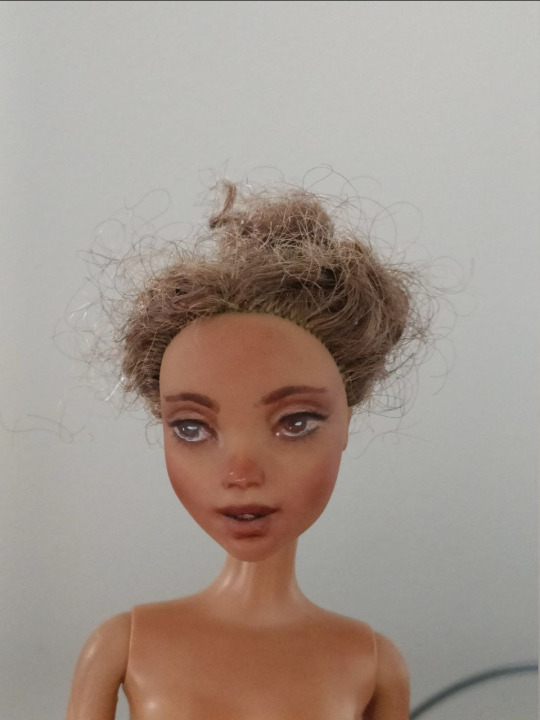
Undergarments
Combinations and stockings
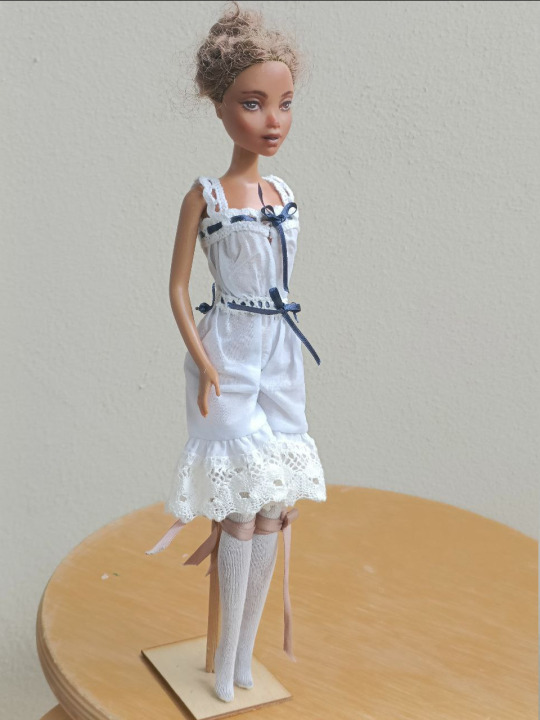
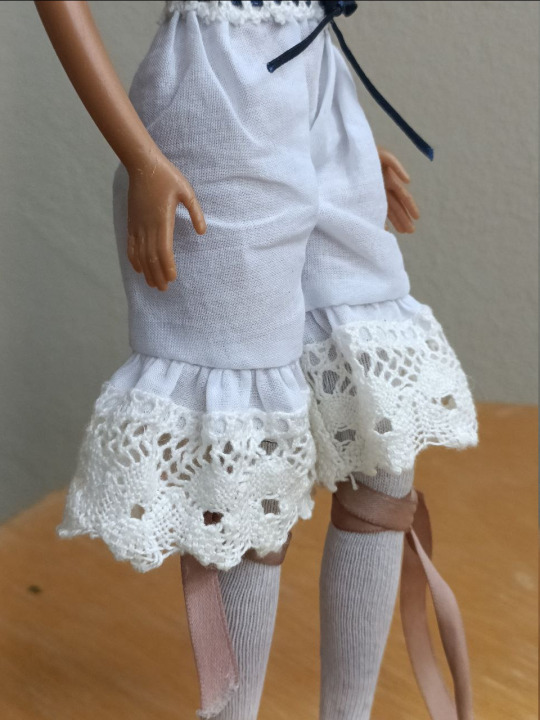
The combinations are split crotch as they were in the period. They are from thin cotton voile I have a lot of and is very appropriate. I didn't have really tiny enough lace for this, so it's kinda bulky, but I think it's okay enough. The stockings are cotton knit, which fits well. The garters are not actually necessary for this doll since her legs are rubbery.
Corset
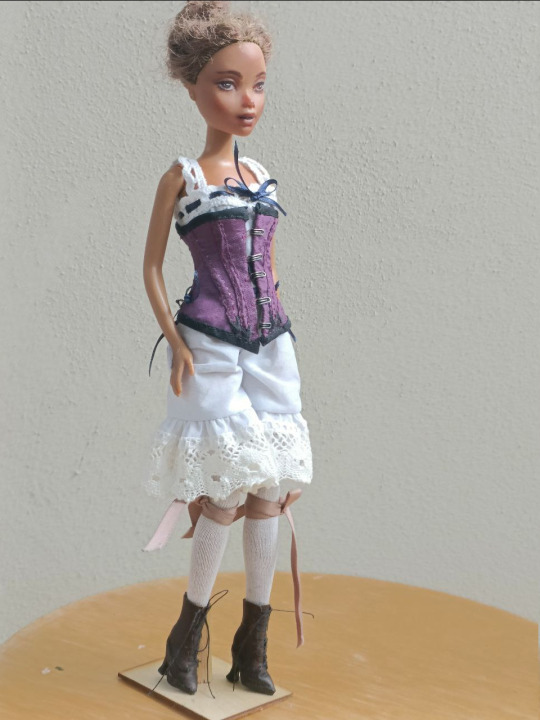
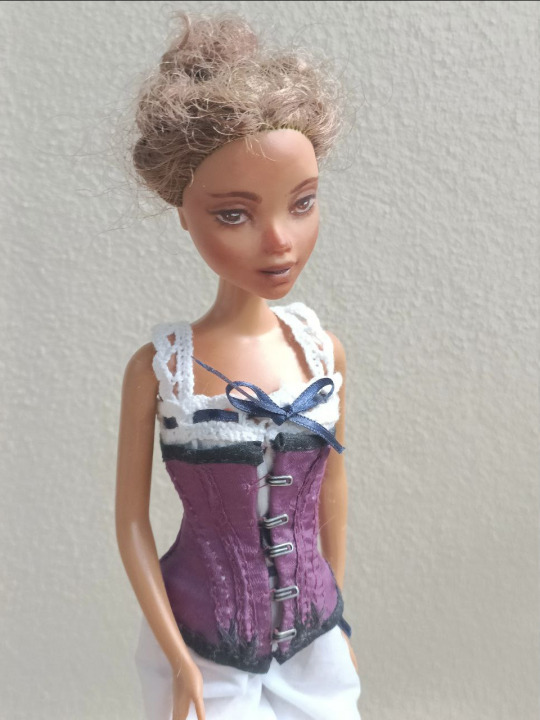
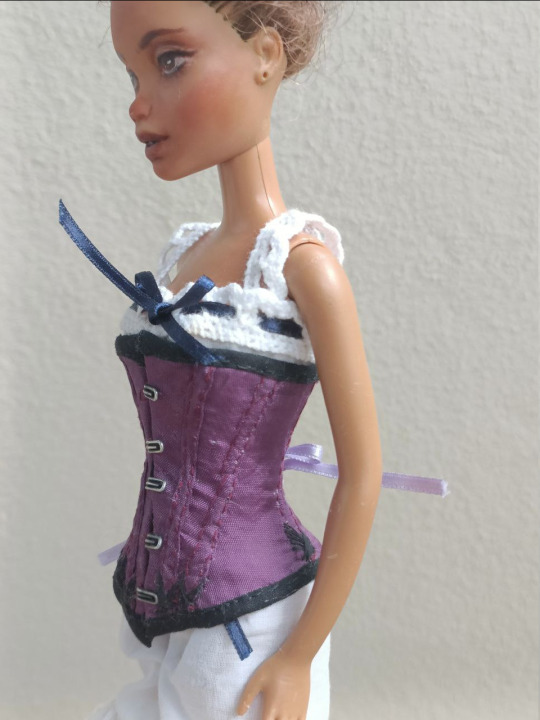
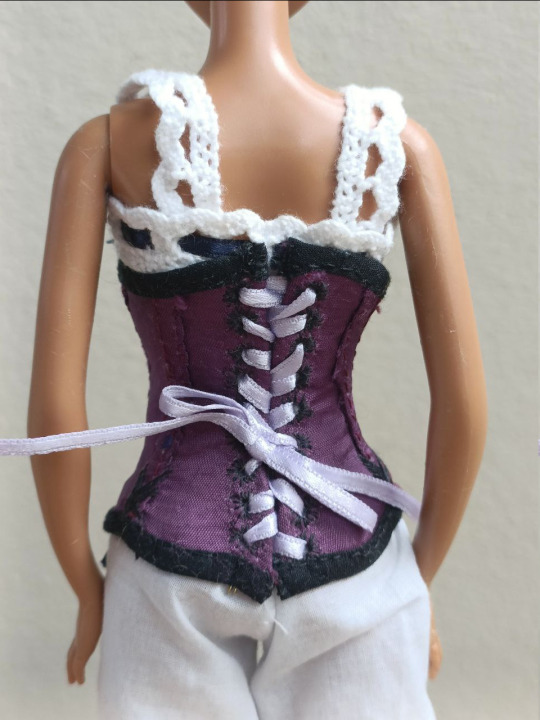
I made the corset from a firm-ish linen and satin rayon pretending to be silk as the fashion fabric. The stitching of the boning channels is not super neat, this fabric is very unforgiving, I didn't have exactly matching thread and the scale made it very difficult. I of course didn't have tiny busk, so I used small hooks, sewed thread loops for them and used narrow metal wire for the edges. I think it looks surprisingly right on the outside. I used the same wire as the boning to reinforce the lacing on the back. I didn't actually use boning elsewhere but the tightly packed linen edges in the boning channels kinda work like lighter boning. I think it keeps the shape pretty ways even with just that. I stitched cotton tape inside to shape the corset further. I also didn't have tiny metal eyelets so I hand-sewed the lacing holes.
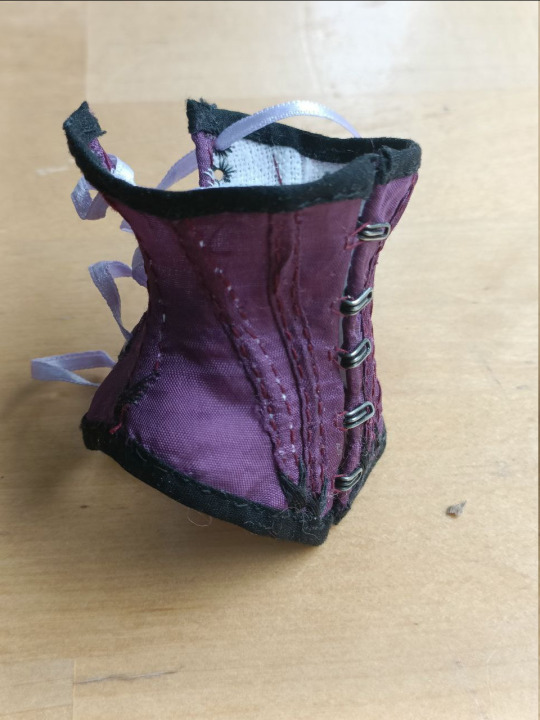
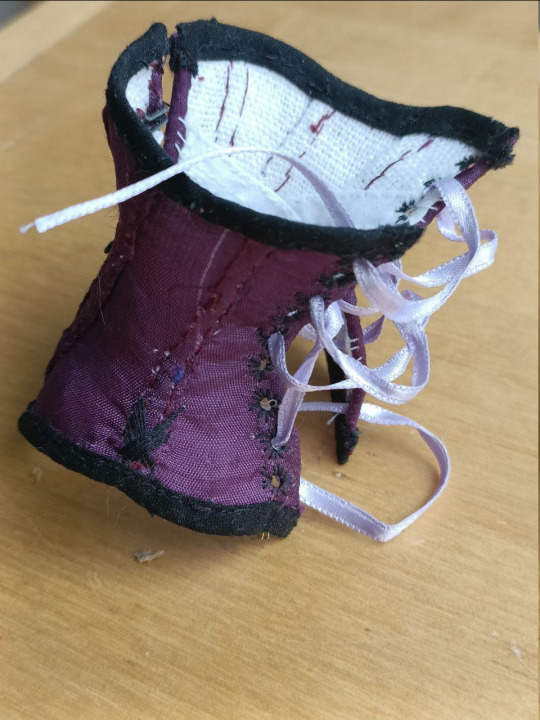
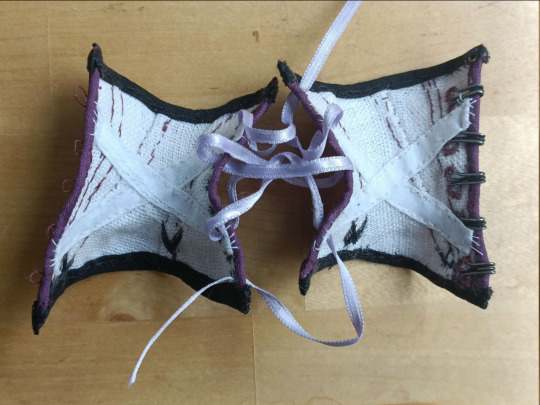
Bustle pad
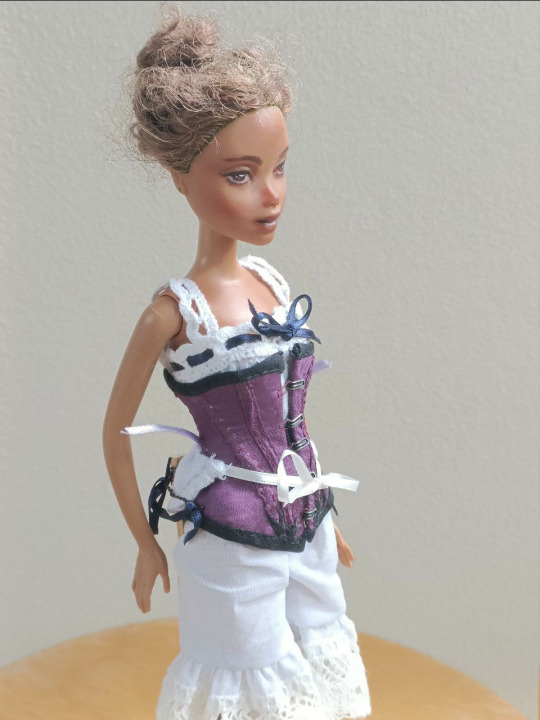
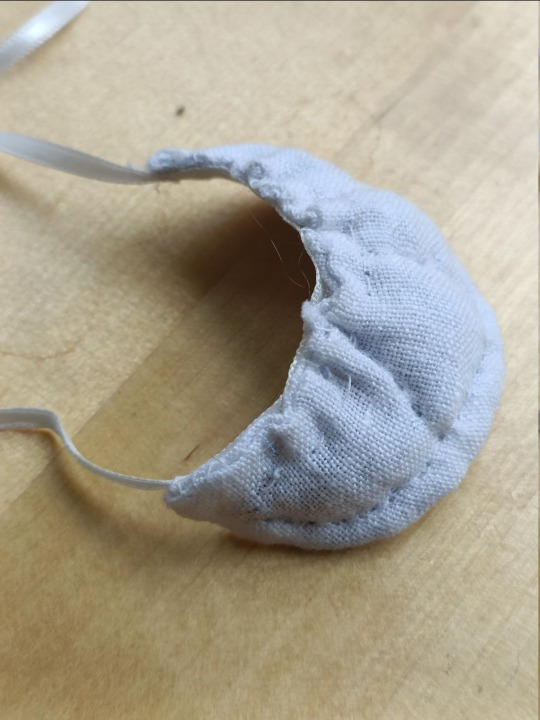
The bustle pad is from linen and stuffed with tiny cabbage.
Petticoat
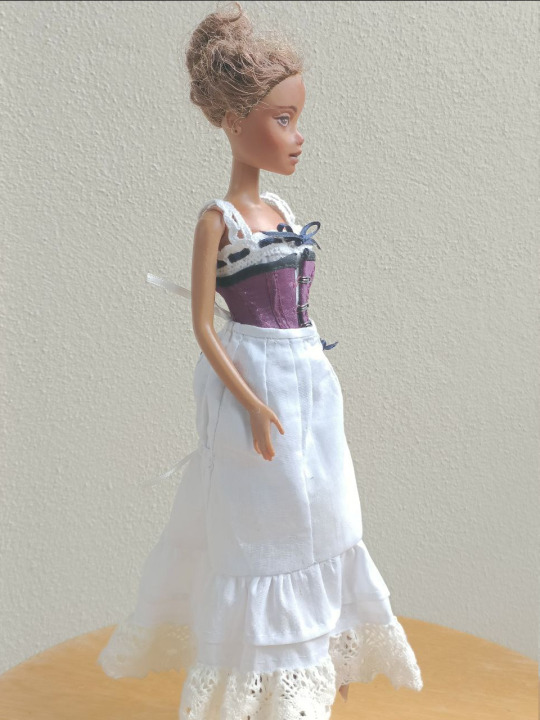
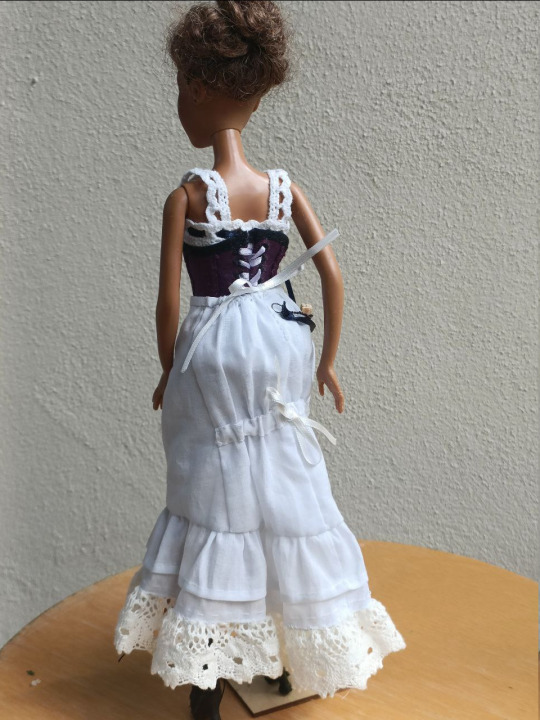
The petticoat is from the same cotton as the combinations.
Outer wear
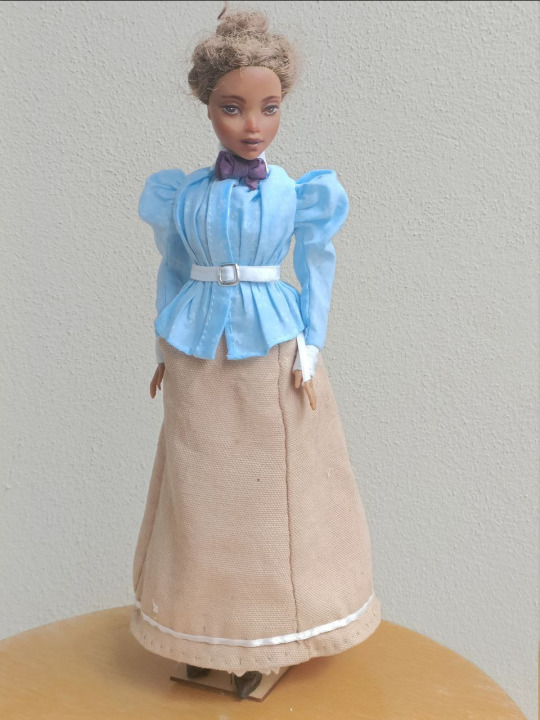
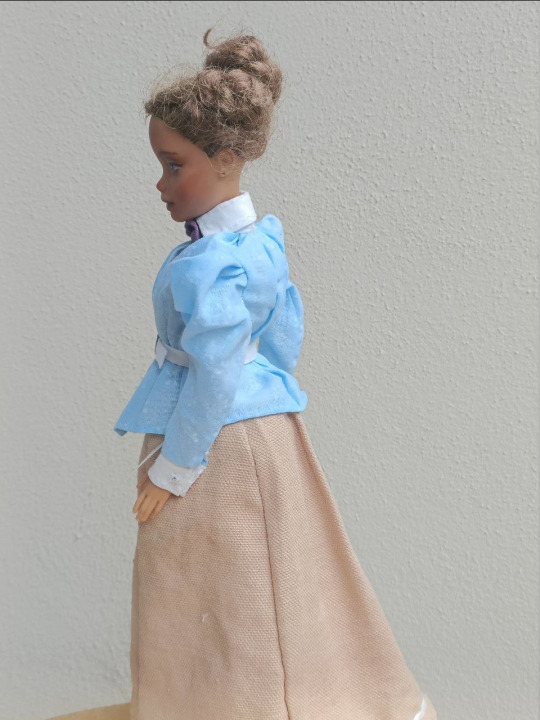
Skirt
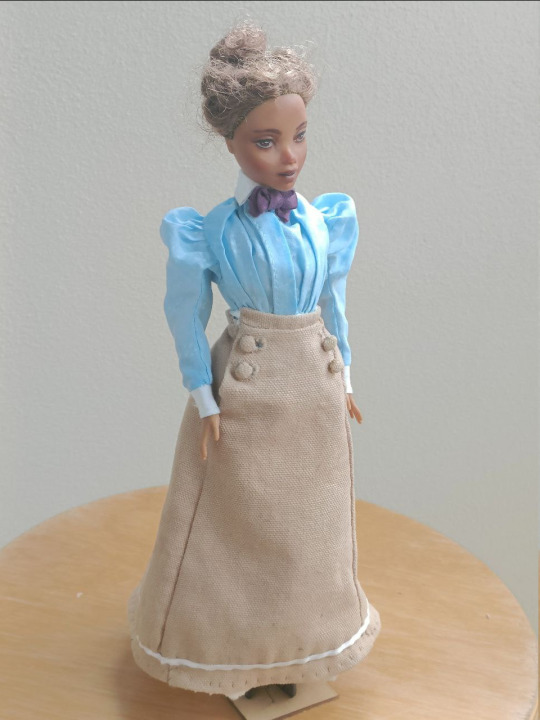
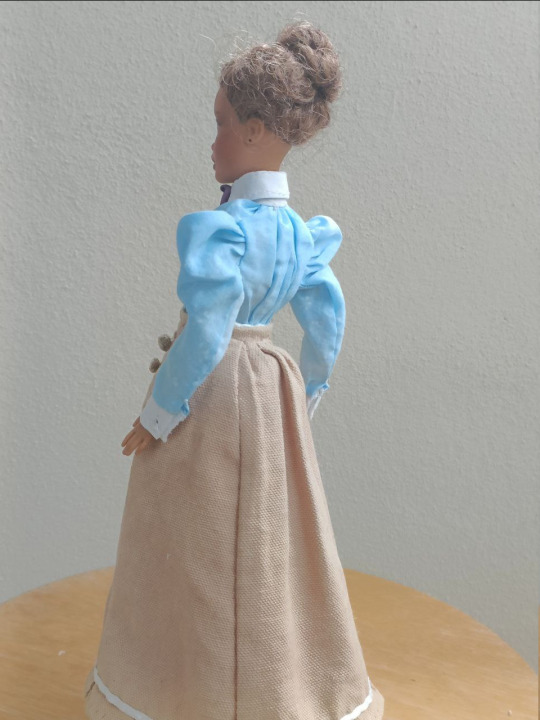
The fabric is cotton half-panama. It's pretty thin, but firm. I would have liked to use a woven wool, but I didn't have any that's thin enough to work in this scale. I think this cotton looks close enough in this scale to a wool with a tight weave, so I'm imagining it's that. My problem was that the cotton was white, but I wanted light brown. I wasn't going to buy any fabric for this, so I did the reasonable thing and dyed it with red onion peals (I've been doing natural dye experiments so this worked well for me).
Shirtwaist
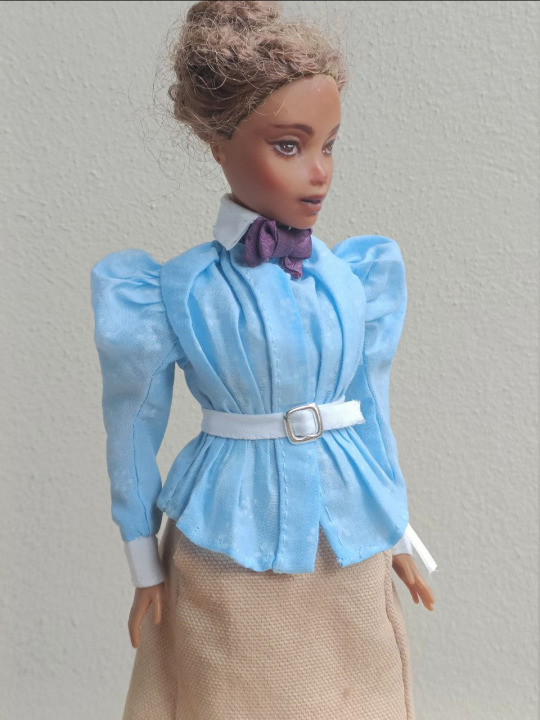
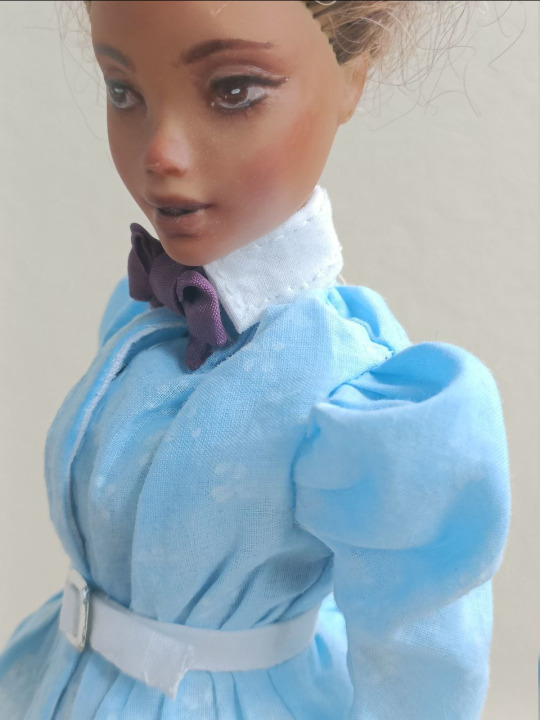
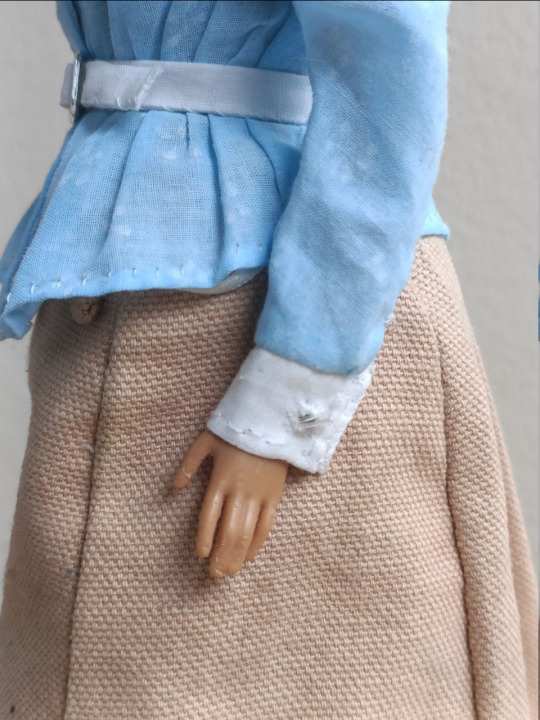
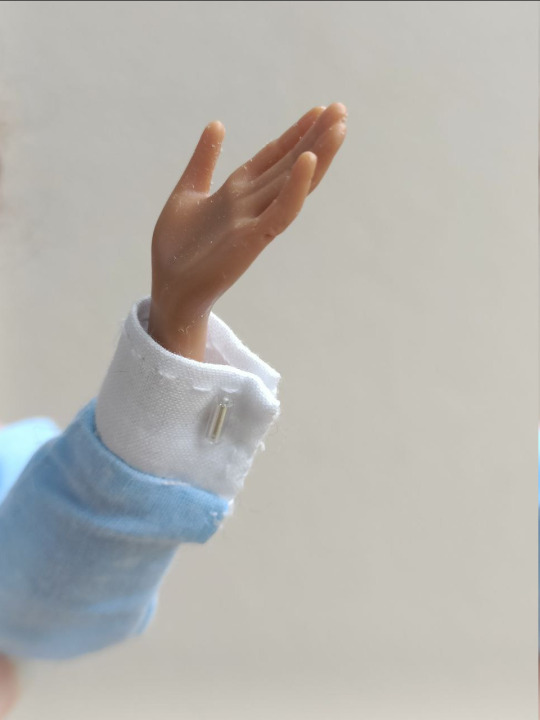
The shirtwaist is from the same cotton as the undergarments. Yes, I dyed it too. I didn't have thin enough cotton in a color that would fit with the skirt and the purple bow, so I dyed it light blue with fabric color. Since I already went the trouble of dyeing I decided I might as well make a small flower print to it since that was popular in the era. I didn't want it to jump out too much but the lighting makes it even less visible. I made it with a white fabric pen. The collar and cuffs are reinforced with linen. I also sewed small stick-like beads to the cuffs on both sides, so one acts as a button (I sewed a buttonhole too) and the other makes it look like they are cufflinks. The bow is from the same fabric as the corset and the belt is sewn from the same cotton as the shirtwaist. The buckle is from a barbie belt.
Waistcoat
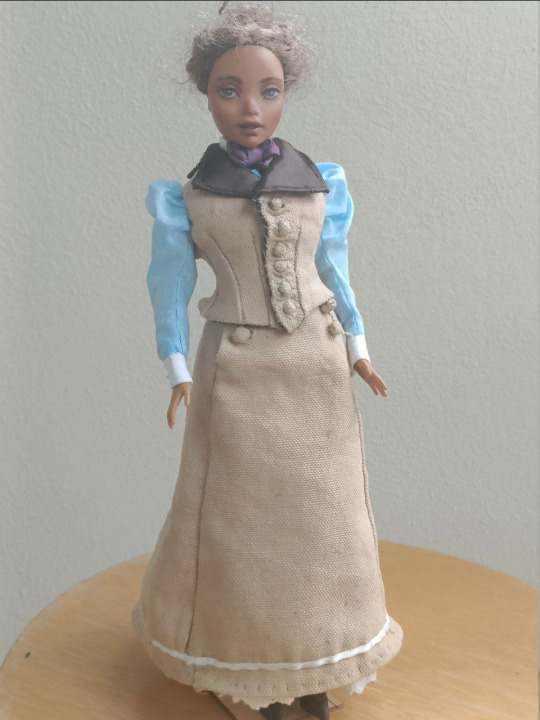
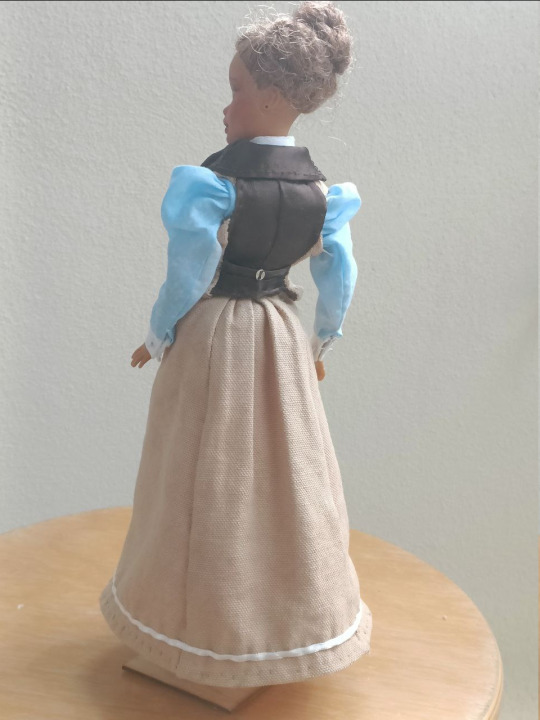
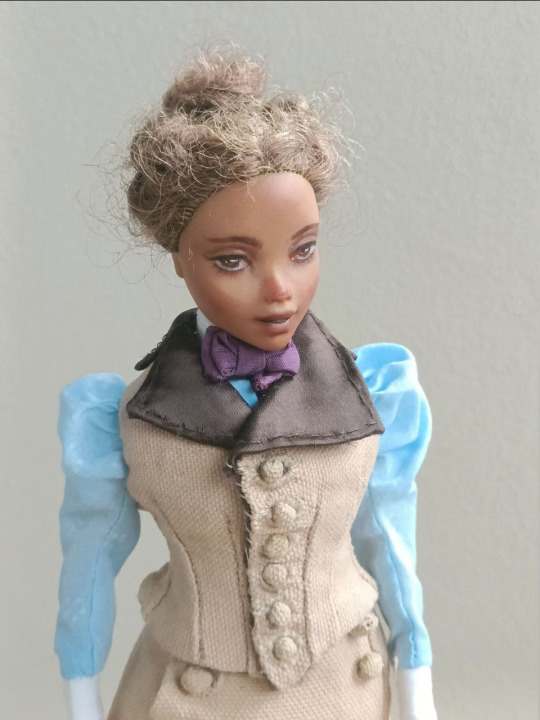
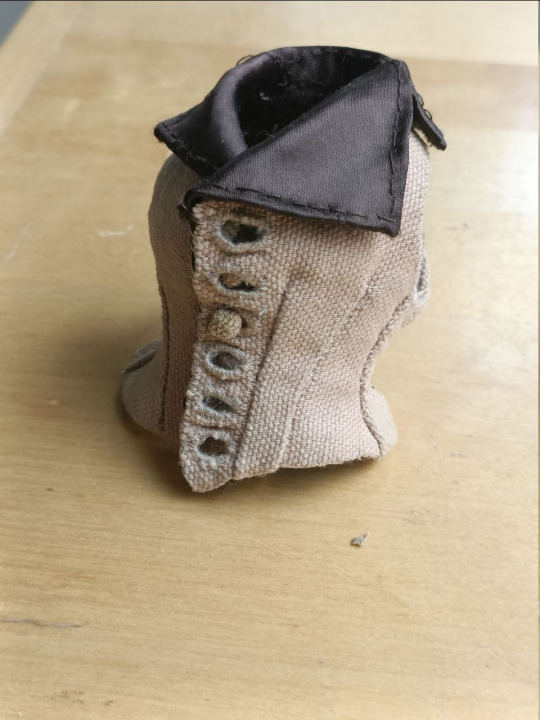
The waistcoat is from the same fabric as the skirt, thought the lapels and the back are from another satin rayon. I tailored the front panels and the lapels by stitching the linen interlining with tailor's stitches (I don't remember if that's the correct word in English) into shape. There is some wonkiness on one side of the hemline for some reason.
Boots
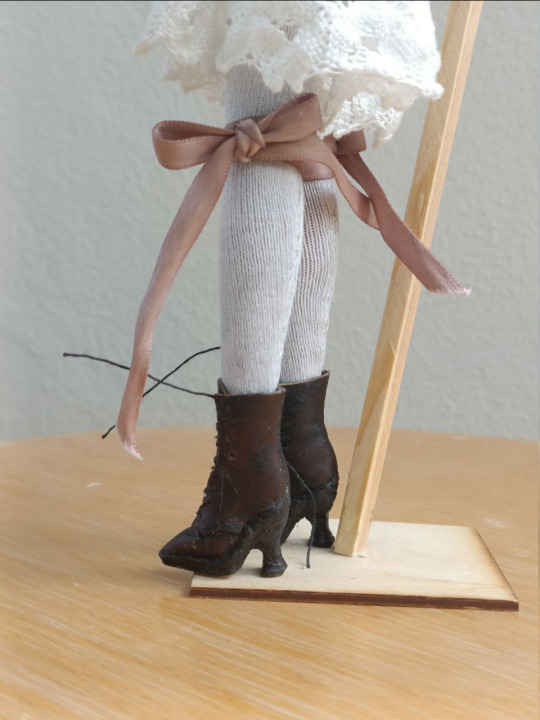
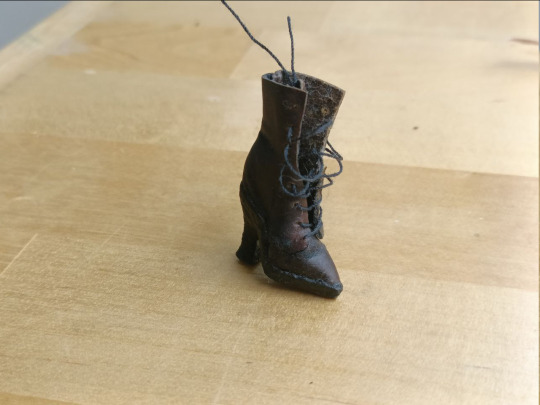
I made the slightly insane decision to make the shoes fully from leather, like they would have been in the period. I had an old broken leather wallet I had saved in case I needed some leather scarps. It has fairly thin leather, so it was workable here. It's light brown though, so I used black shoe polish to darken it. I wanted black or very dark brown shoes. I stacked the heels from glue and leather pieces and carved them into the right shape and sewed the shoe itself to leather shaped as the sole and glued it to the heeled and shaped sole. After I had shaped the shoes and the heels as much as I could I painted the heels black.
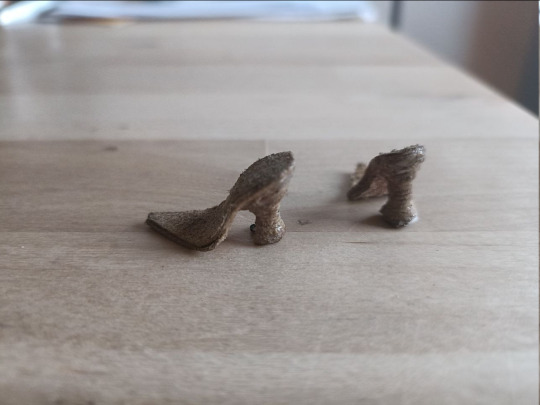
#historical fashion#fashion history#sewing#custom doll#ooak doll#victorian fashion#dress history#costuming#historical costuming#doll clothes#doll customization#historical sewing#my scene#my art#dolls
907 notes
·
View notes
Text
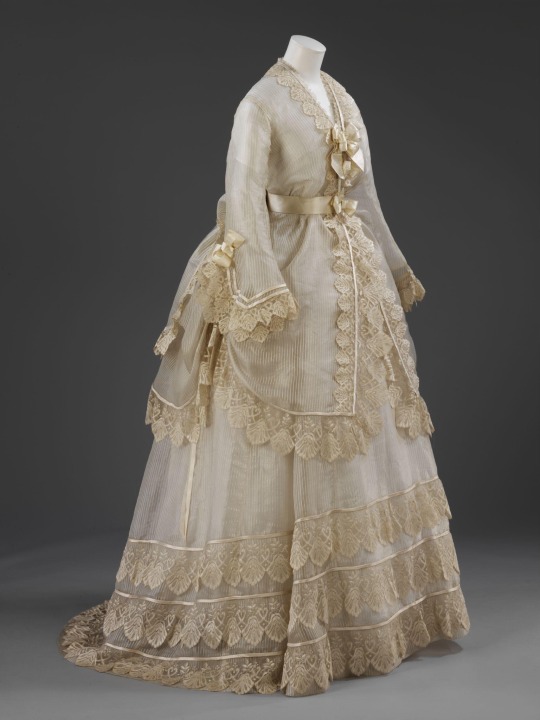

Wedding Dress
c. 1872-1874
“Silk gauze with satin weave stripes, trimmed with satin weave silk and silk machine-made lace, lined with silk, bow supported with a stiff cotton gauze interlining”
V&A Museum
#victorian gown#victorian dress#victorian fashion#wedding dress#wedding gown#vintage wedding dress#19th century fashion#19th century#1870s#Victorian wedding#history of fashion#historical fashion#fashion history#dress history#vintage dress#1800s dress#1800s#frostedmagnolias#historic fashion#fashion#Victorian#white
1K notes
·
View notes
Text
Copy
Alessia Russo x Child!Reader
Summary: You want to be like your sister

It was obvious to just about everybody that you were the happy little accident of the family. Your brothers and sister were so much older than you, with jobs of their own while you were just starting school.
No one liked to call you a mistake though it was certainly the word that went through everyone's mind when they saw you and Alessia standing next to each other.
It was the word that everyone in the England team was thinking of the moment Alessia showed up to camp with you by her side. You were settled easily on her hip as you aimlessly sucked your thumb, no matter how many times your sister pulled it from your mouth.
It wasn't exactly the plan that you would come with Lessi to camp but Mummy and Daddy had to go away and Luca and Gio were too busy to look after you so Lessi was the last choice.
Lessi's your absolute favourite. Mummy and Daddy say it's mean to have favourites but you don't really care. Gio and Luca can stick together because they're boys and you'll stay with Lessie because you're girls.
You want to be like Lessi when you're older and you want to do everything she does.
You didn't use to see Lessi a lot when she played for United but she plays for Arsenal now so you see her a bit more regularly. Lessi's your biggest idol and she doesn't smell bad like your brothers do so you like to be with her all the time.
"Alright," She says, smoothing down your hair," Do we want laces or velcro?"
You look at the two shoe options she's showing to you. You look between them, biting at your lip as you swing your feet back and forth.
"What're you wearin'?"
"Well, I've got laces."
"I want laces!"
Lessi laughs. "Of course you do." She slips the shoes onto your feet and double knots your laces because you're still a bit too little to do them by yourself. You're learning though because Lessi can tie her laces by herself so you're going to learn too.
Alessia's big and tall as she leads you by the hand down to the gym. You want to be big and tall like Lessi too someday and you lean easily into her side as you walk.
"Well, looks like the smallest member of the squad has arrived." Ella's the one speaking and you wave at her. Ella's Alessia's adult best friend so you need to be nice to her. You're Lessi's proper best friend though because she tells you that all the time but you still have to be nice to Ella because Lessi will get sad if you don't.
So, you smile and wave at Ella as Lessi sets you up at the machine she's about to use. It looks very big and complicated but Alessia knows what she's doing because she loads some weights onto it and starts pulling on a rope thing to lift it up and down.
You circle the machine suspiciously, looking at all angles as Lessi takes big, deep breaths as she pulls, releases and then pulls again.
You kind of want to try and you reach your hand up to grab onto it too.
Alessia smiles fondly at you but removes your hand. "Sorry, tesoro. You can't help me."
You frown at that. "Why?"
"Because I have to do this by myself."
"Why?"
"So I can get stronger."
"I can get stronger like you too!"
Alessia's still smiling at you. "You're only little, tesoro. Maybe when you're older."
You don't like that answer. If you wait too long then maybe Alessia won't like you anymore. You don't want her to not like you.
Your bottom lip wobbles and she sighs.
"Hey," She says," How about this? I left my bottle over there by Mary. It's pretty heavy and I need a strong girl to go and grab it for me."
You turn to look where she's pointing. It's one of those big bottles that holds a gallon or something and it's sitting on the floor by where Mary's working out.
"I'm a strong girl," You say and Lessi laughs.
"I know you are. Can you go and grab it for me?"
You nod. You make to run off to grab it before you backtrack so you can give Lessi a hug and a kiss.
You weave your way through the gym before scaring the socks off Mary when you suddenly just appear and start dragging Lessi's water bottle away with you.
"Jesus," She says, placing a hand on her chest," You need to stop popping up like that. You scared the hell out of me."
"Sorry," You say, straining as you drag the bottle with you.
"Do you need some help?"
"No!" You say quickly, puffing out your chest," I'm a strong girl like Lessi. I can do it myself."
"Alright then," Mary says," Off you go then."
You kind of think this is like what Lessi's doing on the machine. She's pulling on something with weight and now you're pulling on something with weight.
So, technically, you are copying Lessi. You like that. You're too little to use the machine but you're not too little to copy the exercises Lessie does.
She's beaming as you come back, dragging the bottle the whole length of the gym towards her. She rewards you with a kiss on the head and half a chocolate bar.
You get tired pretty quickly when Lessi sends you off to do other things that mimics what she's doing on the machines. You wish you were big enough like Lessi to use them but you think doing these little errands makes up for it.
It gets you very tired though and suddenly you can't copy Lessi anymore. You wish you could but you're very tired out so you just kind of sit down with her as she finally goes through some stretches.
You crawl between her legs and rest you head against her shoulder.
Lessi's hands come up to adjust you so you're settled nicely in her lap as she chatters away to Maya and Ella. She's managed to keep stretching around you and you just let yourself sag against.
"I think someone needs a nap," Maya says pointedly and, even though you're exhausted, you still hear her perfectly.
"No," You grumble to Lessi," No nap."
"I think it would help," Lessi says.
You shake your head. "No. Are you nappin'?"
"No."
"Then I'm not nappin'."
Lessi laughs at that before getting to her feet.
You whine when she pulls away from you, stumbling to crowd into her space again.
"Hey," She says," It's alright. I'm just stretching my legs a little."
"Stretching too," You reply softly even though you're swaying a little bit because you're sleepy.
"Come on." Lessie leans down to pick you up and you go limp in her arms. "How about that nap now?"
You shake your head and take a firm grip of her shirt. "Nap if you nap."
"Well," She says," I guess we can nap together today."
859 notes
·
View notes
Text
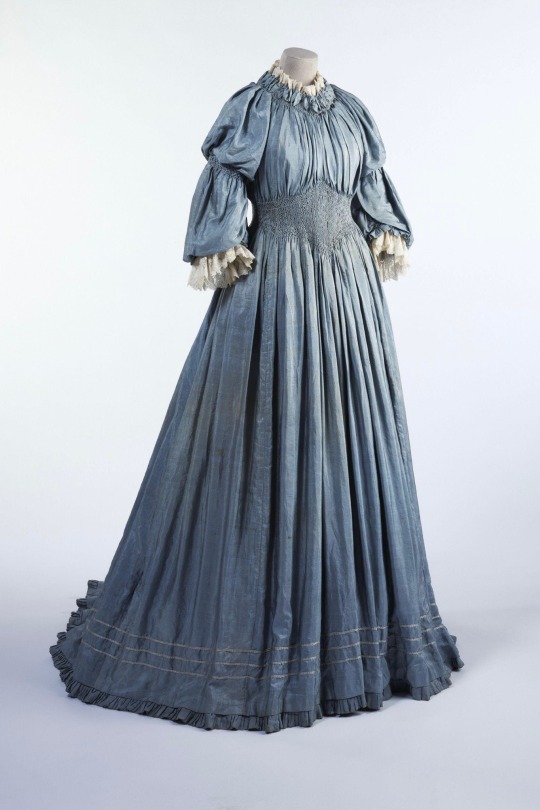

Blue Silk ‘Aesthetic’ Dress, 1893-1894, English.
By Liberty & Co. Ltd.
Victoria and Albert Museum.
#V&A#blue#silk#womenswear#extant garments#dress#19th century#British#English#1890s#1893#1890s dress#1890s England#1890s britain#aesthetic#liberty#liberty & co. ltd.
705 notes
·
View notes
Text
⋆⭒˚.⋆ PHANTOM



˙ ✩°˖📀⋆。˚ Tom Ludlow x Hacker!Reader x Neo Anderson
VOLUME 001
CW: fem!reader, strong language, alcoholism, stalking
Synopsis: Veteran detective, Tom Ludlow, leads the hunt to find the hacker responsible for a cyberattack on the city’s police department with the assistance of Neo, a criminal hacker who he keeps out of jail in exchange for information. 4.0k words.
⋆。°✩ Note: Reader has a hacker alias, like Neo, that she is referred to however this is not intended to be her real name. Although the story takes place in 1999, some creative liberties have been taken with the advancement of the technology but I tried my best to keep it realistic. I did some research but my knowledge of technology, American law enforcement protocols and hacking is limited/non-existent, so I apologise in advance if anything I’ve written is completely inaccurate. And finally, since I decided to set the story in Chicago, Tom works for the CPD rather than the LAPD. I think that’s all.
˙ ✩°˖📀⋆。˚
CHICAGO, NOVEMBER 1999
The door chimes as you step into the refuge of the intimate coffee shop, escaping the deluge of the late autumn thunderstorm. Folding up the damp newspaper you had been sheltering under, you’re greeted warmly by the gentle aroma of freshly ground coffee and cinnamon. Beaded raindrops slide off the hem of your black leather trench coat, leaving a trail of droplets over the rustic floorboards on your way towards the counter.
Exploiting the vantage point, you subtly scope the room, scanning for the individual you have arranged to meet. Amidst the ordinary and familiar, a lone hooded figure hunched in the farthest, darkest corner catches your eye.
Cradling the steaming mug of coffee you ordered, warmth flows from the porcelain, melting the chill from your fingers as you weave through the bohemian maze of tables and chairs. Upon reaching the table occupied by the hooded man, you grab his attention by tossing your damp, tattered newspaper on the cherry-wood tabletop before sliding yourself into the chair opposite him.
“Impressive.” his low rasp flows above the bumble of chatter, the whir of the espresso machine and the clatter of the crockery, as he drums his bitten-nailed fingertips over the smudged headline of the dampened newspaper.
‘CYBERATTACK CRIPPLES CHICAGO P.D.’ it reads in bold font across the front page.
You conceal your troubled frown behind your cup of coffee, sipping slowly. Despite your best efforts to hold yourself with casual confidence, your stomach squirms with nerves as if contaminated by worms that coil and twist, leaving a weight of knots that only grows heavier with every glance over your shoulder.
When the man opposite you lowers his hood, you peek over the brim of the mug. The faint amber glow of the overhead lights casts a warm hue upon his pale face, revealing his buzzed haircut, sharp grey eyes and a cursive tattoo above his right brow that reads ‘escape.’
“I can see why you’re interested in some additional protection.” his hushed tone is laced with a knowing edge, as he leans forward, elbows resting on the tabletop, assessing you with a tilted stare.
“You got it?” you waste no time with false pleasantries, uninterested in conversation, you would rather keep this brief. Disregarding his attempt to assert control, your cool exterior remains unflinching as you nonchalantly trace your middle finger along the edge of your mug.
You catch the shift in the muscles of his cheek as he clenches his jaw and leans back into his chair. Grudgingly, he reaches into the pocket of his dark hoodie and pulls out a nondescript disc case. The clear plastic gleams under the overhead lights as he drops it on top of the newspaper with a sharp huff.
You quirk an eyebrow at his insolence, offering no more than that before your attention is snatched by the disc. Picking up the case, you turn it over in your hands and examine it with narrowed eyes.
“This is the only copy?” you double-check while opening the case with a soft click. The disc glimmers as it catches the light, momentarily illuminating your face.
“It’s custom software. No trails. No backups.” he affirms, crossing his arms over his chest.
Satisfied with his response, you scope the room once more, noting how the other patrons are too absorbed in their own lives to notice the rolled up wad of cash you slip into his waiting palm.
“Always a pleasure.” he appears pleased with the payment and stuffs the money into his pocket before he pulls his hood back over his head and leaves the table. As you take a sip from your coffee, the chime of the door echos and the draught from the storm sweeps in as he disappears into it.
˙ ✩°˖📀⋆。˚
The glaring artificial light from the monitors reflects off the lenses of Neo’s metal frame glasses while his long, jittery fingers click furiously across his keyboard. The perpetual clacking of the keys blends with the low hum of Mezzanine by Massive Attack echoing from the stereo system through the dull and bleak apartment, drowning out the sound of the storm outside. Cables snake across the bare floor, intertwining with the wheels of the worn desk chair. Neo is hunched over his chaotic desk, littered with discarded snack wrappers, empty coffee cups and energy drinks.
Locked in the digital labyrinth, Neo navigates it with unblinking eyes, the code mirrored in his pupils is no doubt permanently scorched into his retinas. The heavy shadows under his eyes are a testament to the endless caffeine-fuelled nights he spends sitting at his computer.
A heavy, insistent knock at the door shatters Neo’s focus, tearing his gaze from the monitors with an agitated groan. The distinct knock and the late hour of the visit tell him exactly who’s at his door.
With a huff, Neo turns off his stereo and pulls himself to his feet, stretching his arms over his head to relieve the tension in his stiffened joints. A satisfied moan rolls from his lips and his black T-shirt rides up, revealing a sliver of his pale, sun-deprived skin as his bones click and pop. He pads softly towards the door on socked feet, stepping over tangled cables and discarded wrappers along the way.
Just as he expected, he opens his door to find Tom Ludlow in the dark hallway, leaning against his door frame with a stretched arm. The hardened, veteran detective invites himself inside without waiting for an invitation, the pungent scent of vodka clings to him and wafts into Neo’s dreary apartment as he enters.
“You look like shit.”
The gruff remark comes as no surprise, Tom isn’t exactly known for his sunny disposition.
“You don’t look any better.” Neo kicks his door shut with a grumble before slouching back into his desk chair, returning his attention to his monitors and diving back into the digital labyrinth. Meanwhile, the seasoned cop noses around the cluttered apartment with a disapproving frown tugging at his lips.
Tom lets his heavy body sink into the cushions as he drops onto Neo’s worn two-seater with a long, drawn out sigh of relief. It’s the first time he has had an opportunity to relax all day. He takes a moment to appreciate it.
“That might have something to do with the fact I just spent the last twelve hours dealing with a fucking cyberattack that’s got the whole damn department by the balls.” Tom rests his head down on the back of the couch and closes his eyes as he rubs his hand over his weary face.
“What’s your excuse?” he pauses, lifting his head, letting his eyes trail from Neo’s socked feet to his tousled, unwashed hair. “You’ve got all the time in the world, you could at least attempt to make yourself look half-decent, if you stepped away from that computer for two goddamn seconds…” Tom trails off, realising his frustration might verge on cruelty if he lets himself continue. Instead, he shifts his focus to the murky apartment. “You know, I’ve raided crack dens cleaner than this…”
“So the cyberattack really pissed you off, huh?” Neo turns in his desk chair without acknowledging Tom’s insolent remarks.
“Of course it fucking pissed me off! The entire network is shut down, there’s an encryption or something, I don’t know, blocking access to all the files and data. The Captain’s on my ass to solve this shit internally and find the bastard responsible before the Feds start poking their noses in with all their red tape and bureaucracy bullshit. You know, I always said, you can't rely on computers. The whole damn department is falling apart because everything's digital these days. A cyberattack can bring down an entire system. You couldn’t hack a piece of paper. No, you'd have to burn down the whole damn building or something to get rid of all the physical files.” Tom throws his head back on the couch again and stares up at the stained ceiling, while Neo discreetly rolls his eyes at Tom’s drunken rant and aversion to modern technology.
“Dude, I hate to tell you this, but you’re in way over your head. You’d be better off saving yourself the hassle and leaving this one to the Feds.” Neo advises Tom, clearly doubting his ability to uncover the hacker.
“What do you mean?” Tom leans forward, resting his elbows on his knees.
“You’re basically looking for the Banksy of cybercrime. A ghost. They’re completely untraceable. There are entire forums full of conspiracies — people think they’re ex-CIA, others are convinced they’re not even real.” Neo’s enthusiasm as he talks about the mystic hacker is met with an unimpressed glare from Tom, who rises from the couch and stalks toward him.
“Believe me, they’re real. A real fucking pain in the ass.” Tom grumbles sourly, hands resting on his hips. “What else do you know?”
“Just that they call themself Eris.” Neo softly mumbles, looking up at Tom from behind his glasses.
“And you found out all this on your forums?” Tom narrows his eyes while vaguely gesturing towards Neo’s monitors.
“Yeah, pretty much… I’ve been following it ever since the news broke. They’re going crazy.” Neo glances over his shoulder towards his monitors before returning his focus towards Tom when he is suddenly hit by a fresh wave of realisation.
“Hold on… you knew nothing? You mean, you’ve been chasing your tails for the last twelve hours?” Neo raises an eyebrow while barely managing to stifle a laugh.
“It’s been pretty fucking hard with the entire department’s network shut down!” Tom immediately snaps defensively. “What do you think I came here for?”
“Okay, I get it, you want my help.” Neo lets out a deep sigh, gently swaying his desk chair side to side as he bounces his leg and avoids Tom’s fierce gaze. “But Eris isn’t just some run-of-the-mill script bunny, we’re talking about a master. It’ll be virtually impossible to track down their identity.”
“So you’re telling me you can’t do it?” frustration seeps into Tom’s tone as he folds his arms across his chest and leans against Neo’s desk, causing the empty coffee mugs to rattle.
“I didn’t say that.” Neo perks up and straightens himself in his desk chair as if trying to shake off the weight of his own self doubt. “Listen, I’ll try, okay? But I can’t guarantee that I’ll find anything. You’re asking me to find a ghost.”
“Even ghosts can leave traces, Neo.” Tom offers Neo a firm, encouraging pat on his shoulder before dragging himself back over to the worn two seater couch. Exhausted after a long, stressful shift and subdued by the vodka, Tom collapses onto the cushions horizontally.
˙ ✩°˖📀⋆。˚
The faint click of keys is broken by the sharp hiss and pop of another energy drink opening as Neo scours forum after forum. The glow from the monitor is the only source of light in the room as he reads through endless streams of contradictory information and preposterous conspiracies. His attempts to reach out to fellow hackers has been predictably futile — dead ends, dismissals and wild goose chases.
When the deep repetitive rumble of snoring begins to flow through the room, Neo glances back at Tom, who is passed out cold with his arm dangling off the side of the couch. With a huff, Neo shoves his headphones on and blasts The Downward Spiral by Nine Inch Nails loud enough to drown out the sound.
Hours pass, punctuated by the clicks of his keyboard. His head feels foggy from exhaustion and the streams of meaningless data he has sifted through. But then, a pattern begins to emerge from a series of recurring orders of high-end custom encryption software from underground markets, all linked with the same digital fingerprint. A breadcrumb trail. His heartbeat quickens as he runs the information through a data-mining algorithm, leading him deeper down the rabbit hole. That’s when he finds it — an encrypted communication between Eris and a known cyber dealer.
The message is brief but reveals a meeting took place just a few hours ago at a local coffee shop, finally giving Neo a physical location to place the illusive hacker. With his pulse hammering, Neo hacks into the security cameras and pulls up the footage for the exact hour the meeting was scheduled.
Neo’s fatigued eyes scan the pixelated footage, searching for the possible suspect. His breath catches at the sight of a woman wearing a leather trench coat, walking with a confident stride. She tosses a newspaper on a table occupied by a hooded figure, before sliding into the chair opposite. Neo zooms in, every detail sends a jolt through him — her pretty face, subtle confidence, the quirk of her brow, the way her middle finger traces the rim of her coffee cup.
She’s perfect. So perfect and stunning.
Neo’s heart throbs, for once, it’s not due to the obscene amounts of caffeine in his system. A mixture of fascination and desire floods through his body and the hunt for the high-profile hacker slips to the back of his mind. He loops the footage, letting his mind drift until something in the video yanks him back to reality. He watches the man hand her a nondescript disc. After a brief inspection, she slips a thick wad of cash into his waiting palm in return.
Neo shakes his head, in an attempt to clear the haze of desire clouding his judgment. He replays the footage again, rewatching the exchange several times, until there is no doubt in his mind that she is the one he has been searching for.
Neo slumps back into his chair, defeated and elated all at once. He hadn’t expected this. Not only is she brilliant, elusive and smart but also gorgeous. It’s not fair. Staring at the frozen image on the screen, his mind races. The initial plan to assist Tom vanishes in a wave of wild impulse. Eris isn’t just another faceless criminal anymore. She is no longer a mystic ghost that exists only in the depths of endless conspiracies on hacker forums. Now, she is real, tangible and absolutely captivating. Neo knows he can’t just give her up.
“Fuck.” he groans, pulling off his glasses and burying his face in the palm of his hands with his elbows resting on the few clear spaces left on his cluttered desk. He tries to process the whirlwind of emotions flooding through his mind.
“What’s wrong?” Neo hears a faint grumble. His head snaps up, panic surging through him. He nearly gives himself whiplash with how fast he turns to look behind him. Tom, in a half-dazed state, sprawled on his stomach, his cheek pressed against the cushions and his arm dangling off the side of the couch, is just barely starting to come to his senses.
“N- Nothing… just…” Neo’s tone wavers with panic, his jittery fingers scramble to urgently close the security footage. He feels his face flush as he blurts. “I was… uh… I- I was watching porn.”
Neo freezes, his eyes widen and his face pales after those words leave his mouth without a trace of forethought as he wonders, out of all the possible excuses, why the fuck did he say that?
Still half-asleep, Tom huffs as he sits up, groaning at the throbbing ache in his skull from his hangover. He pauses, trying to process Neo’s words.
“You were… what?”
“I- I mean, no, I wasn’t—”
“Neo, are you being fucking serious?” Tom growls, his voice raising, along with his stress and frustration, his expression hardens with disbelief. “You’re telling me, instead of tracking down the hacker, like I told you to, you’ve been sitting there jacking off — while I’m right here! — like some kind of fucking creep. What the hell is wrong with you?”
“No! It’s not like that!” Neo pitches in desperation, his cheeks blazing red, realising what a freak he just made himself out to be.
“I haven’t got time for your bullshit excuses, Neo. I’ve got to get back to the station and do some actual police work.” Tom shoots up from the couch and paces, distractedly checking his pager for any updates from the department. “I should’ve known better than to trust some wannabe hacker, you can barely make it in the virtual criminal world on your damn computer, never mind the real world. I don’t know what I was thinking.”
Neo jolts in his chair at the slam of the door, surprised it’s still on its hinges with the way Tom roughly swung it shut behind him after storming out. He knows Tom is stressed, frustrated, and hungover — a toxic combination — but that doesn’t soften the sting of his cruel words. They cut deep, no matter how much Neo tries to tell himself that Tom probably didn’t really mean them.
“Well done, Neo.” he mutters bitterly to himself, the sound of his own voice barely above a whisper in the now-empty room.
˙ ✩°˖📀⋆。˚
Neo is fully aware that what he is planning to do isn’t exactly sane or rational. After Tom stormed out, he spent hours combing through more of the security footage, discovering that you frequent the coffee shop almost daily. You always settle in the little nook by the alcove window, overlooking the bustling city streets, with the same order: a coffee and panini. Now, on impulse, he has decided to visit the café himself, hoping to catch a glimpse of you in person.
Water droplets cling to his freshly showered skin, trickling down his pale frame in slow, meandering paths. A dark towel is wrapped securely around his hips, where faint tufts of dark, coiled hair peek out from beneath the terry cloth on his lower abdomen. He rifles through a haphazard pile of clothes on the floor, lifting several shirts to his nose, inhaling deeply before discarding them, searching for the freshest one.
Neo trails his sunken eyes over his reflection in the smudged mirror, a shaky breath escaping his moistened lips at the sight. His jittery fingers pat down his slicked back hair, pushing stray strands into place. The contact lenses — a change from his usual glasses — feel heavy on his tired eyes, sharpening the fuzzy edges of the world around him.
The sight of himself so neat and put together feels strange and offbeat — like a Halloween costume, if the costume was ‘Normal Guy.’
When Neo arrives at the coffee shop, he makes a sensible choice and orders decaf. He is jittery enough without the added rush of more caffeine racing through his veins. This coffeehouse isn’t his usual haunt — he tends to stick to instant coffee at home — but he can understand why you like it here. The cozy warmth and hushed ambiance even manage to unwind some of the tension coiled inside him as he settles at your usual table, the one tucked away in the nook by the alcove window. He hopes you’ll glance over to check if your favourite spot is taken — and see him. That would be enough. Then he will know you’re aware of his existence. Neo’s plan doesn’t extend much further than that for now.
The coffee, however, sits untouched as Neo anxiously taps his foot, his focus flicking between the door and the clock on the wall. His unsettled heart spasms with every chime of the door — half longing, half fretting — that it might finally be you, stepping over the threshold.
He wipes his palms on his dark jeans, feeling the contact lenses prick against his tired eyes.
Then the door chimes again.
Neo’s breath hitches. His heart leaps.
As soon as he lays his eyes upon you, the world ceases her rotation. The hushed chatter, clattering mugs and hissing steamer blur into a distant hum, drowned out by the pounding of his throbbing heart against his ribcage. You step through the door, carrying yourself with effortless confidence that, to him, seems otherworldly. There’s something magnetic about you, every cell in his body feels the tug, luring him toward you.
You haven’t noticed him. Not yet. But you will.
Suddenly, there’s too much saliva pooling in his mouth, he swallows thickly, desperately trying not to choke and make a fool of himself. His fidgety fingers twitch, reaching for his untouched coffee cup just to keep them occupied and anchor himself. He fears he might float away, like an untethered balloon, if he doesn’t hold onto something solid.
It’s an overused expression, but he truly can’t believe his eyes. You’re real, standing right there, only a few feet away. Adrenaline surges through his quivering body, sending his pulse into overdrive. His thoughts glitch and stutter, suspending him over a chasm of indecision, caught between yearning to get closer and the impulse to crawl under the table before you notice him.
Before Neo has the chance to do either, the door chimes once more.
His eyes widen at the sight of Tom following behind you.
What the hell is he doing here? What the hell is he doing with you?
His mind floods with questions that twist his anxious stomach into knots. Did Tom figure out who you are? Has he caught you already? It doesn’t look like he’s arresting you. Perhaps he is just questioning you.
Panic coils around Neo’s heart like barbed wire, his fingers tighten around the coffee cup. Neo’s eyes bounce between you and Tom, trying to piece together an explanation, but it only leaves him more confused, more anxious.
This doesn’t make any sense.
His heart hammers against his ribs, dangerously hard, as Tom leans in, speaking to you in a way that’s far too casual, far too familiar. Neo’s mind spirals. Tom doesn’t look suspicious of you — he doesn’t seem suspicious of anything. In fact, he almost seems… apologetic.
The detective's lips move with words Neo desperately wishes he could hear, he wants to know what makes you stop and listen. Neo gulps, trying to force the air trapped in his throat back down to his lungs as he watches you process Tom’s words. Whatever he said, causes the faintest smile to tug at your lips, and Neo feels an unfamiliar twist in his chest, bitter and sharp.
It only worsens when he watches a rare curve appear on Tom’s usually rigid face. Since when does Tom smile like that? It’s all because of you…
You’re… amazing. Neo knows that for certain now, you had to be to crack someone as hard as Tom. That’s why Neo is so drawn to you, your power, your allure. No one else possesses the power to soften a man like Tom. No one but you.
But what do you see in him? Jealousy coils tighter in Neo’s gut, while his admiration for you grows with every second. You’re remarkable, strong, gorgeous, untouchable. And Tom? He doesn’t deserve any of it. He doesn’t deserve your smile, your time, your company. Neo hates it.
His jaw tightens when Tom pays for your order. What do you do to him? Tom isn’t charmed by just anyone. Neo’s thoughts churn, his unsettled mind runs in circles and his grip on the coffee cup tightens as he watches, helpless, waiting for the pieces to fall into place. But the puzzle remains a mess.
Then, your eyes shift.
Neo’s heart stumbles and drops like a rock and your gazes lock. His body freezes and his tumbling heart quivers with a racing pulse. No… no, no, no…
You saw him.
Neo quickly diverts his attention, but it’s too late. That one moment, your eyes locking, that was enough. An icy shiver crawls down Neo’s spine, melting at the base as dread seeps into his veins. She caught me staring? What must she think?
Neo’s chest tightens as you lean closer to Tom, he can’t hear your words, but the way you nod subtly in his direction makes his throat go dry. You’re telling him. You told him. Panic spreads like wildfire as Neo’s eyes dart around, wondering how quickly he could bolt to the exit without making a scene, but before he can act, Tom turns. The soft smile is gone, replaced by the sharp, hardened look Neo is more familiar with.
Tom’s gaze lands directly on him. Oh fuck. Now you’re both looking at him.
˙ ✩°˖📀⋆。˚
⋆。°✩ Note: I’m sorry this part is very reader lite but don’t worry reader is in the next part from start to finish and I’ll introduce the third mystery keanuverse character! Thank you for reading and I hope you enjoyed it enough to come back for more! VOLUME 002 will be posted in November!
#keanu reeves#neo anderson#thomas anderson#the matrix#tom ludlow#street kings#neo x reader#neo anderson x reader#thomas anderson x reader#tom ludlow x reader#neo x reader x ludlow#neo anderson x reader x tom ludlow#my fics#my fic#keanu reeves fanfic
95 notes
·
View notes
Text



1926 Day dress of light blue cotton voile embroidered with raised blue floral motifs and smocking; 1923 Day dress and sash of moss green open weave tattersall cotton trimmed with machine made white cotton lace. From Augusta Auctions.
81 notes
·
View notes
Text
Dress, circa 1883-1885, Scotland
Silk, cotton, linen, metal




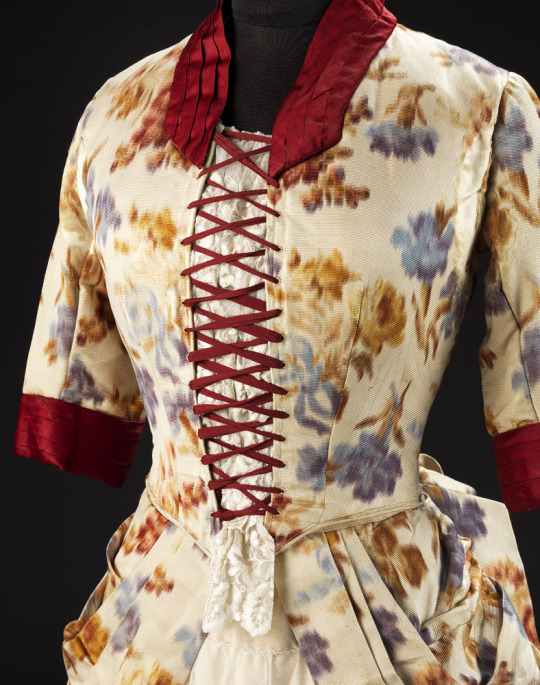

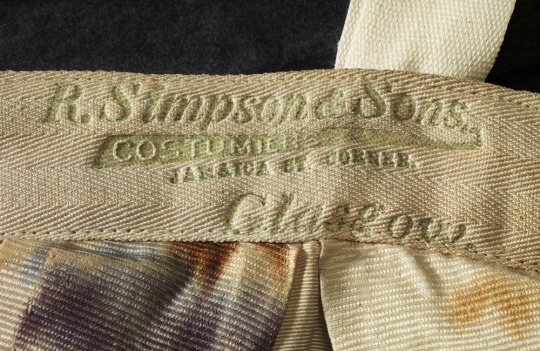
Description: Woman’s dress in cream corded silk chine printed with abstract floral design in red, blue, brown and yellow, with small, rectangular neckline with facing in pleated red silk satin, fitted bodice constructed in six panels, fastening centre front with red cord lacing through fourteen pairs of eyelets over a stomacher-style panel of horizontal cream machine lace frills. Elbow-length sleeves with pleated red silk satin cuffs. Skirt, full-length, fastening on left with five metal hooks and eyes, chine overskirt pleated into waistline at front and over hips at side, side panels trimmed with vertical border of cream machine lace and frill of cream machine lace extending into lower side edges of train, centre back cut-in-one with bodice with additional width in skirt to go over bustle, extending into a long train, red silk satin frill under hem. Petticoat-style underskirt revealed in front in cream silk satin underskirt decorated with six slightly asymmetrical horizontal rows of cream machine lace. Bodice lined in printed cotton, fitted with eight metal bones and waistband. Skirt front lined with linen and printed cotton, sides and back lined with printed cotton, integral thirteen-inch wire mesh bustle with two sets of twill weave tapes to pull fullness to back to create train, balayeuse around hem of skirt and train. Waistband printed in light green ‘R. Simpson and Sons Costumiers Jamaica St. Corner Glasgow’.
Worn by Ann Smith, the wife of Robert Kirk Simpson of R Simpson and Sons.
This romantic dress is printed with roses and has machine-lace frills on the skirt. In the 1870s and 1880s fashion looked back to the late 1700s, with its flamboyant fabrics, for inspiration. The blurred effect on this evening dress is created by printing the warp prints before the fabric is woven. This ikat technique originated in Asia and was introduced to France in the mid-1700s, where it was known as chiné. Here, it’s use, together with the laced bodice and open over-skirt draped back over the hips and into the bustle, reflect the historical revival style with its imitation of an eighteenth-century open gown.
Glasgow Museums Collection Online
152 notes
·
View notes
Note
Why....why are the sweaters 3/4 sleeve??? Personally I would totally get a black sweater (or white tbh) but I can't vibe with a 3/4 sleeve (for a few reasons, mostly various sensory/attention problems) so i was wondering why that choice was made and whether there's any chance of a full length sleeve being made in addition or instead? But also I'm curious as to exactly what kind of fabric it is? Is it an anti-pill material? (Pilling is one of my fabric enemies)
so first off, this as is about the lace collar sweaters that will be hitting the store later this year. you can watch the full video here, but i’m including screenshots as well for those of y’all who don’t want to watch the video.
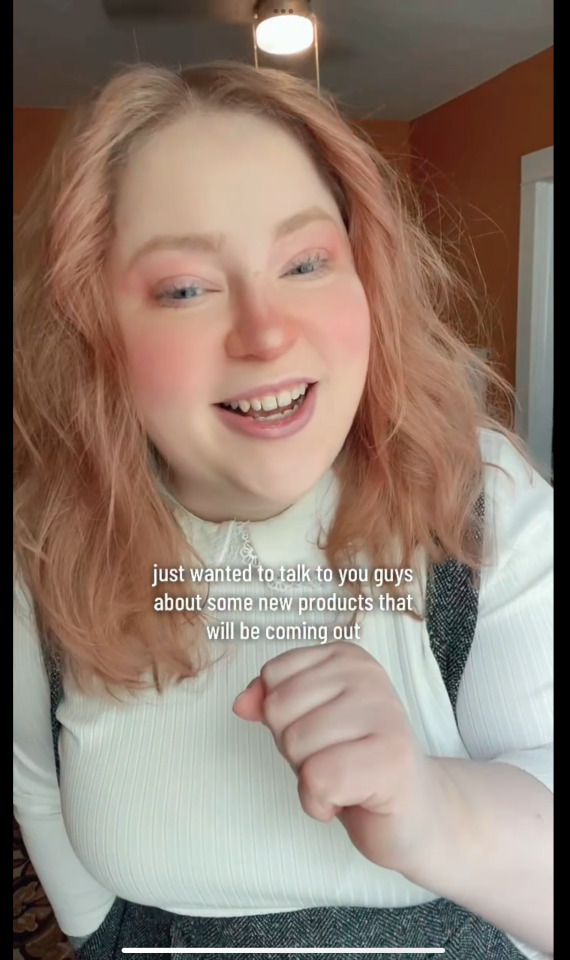
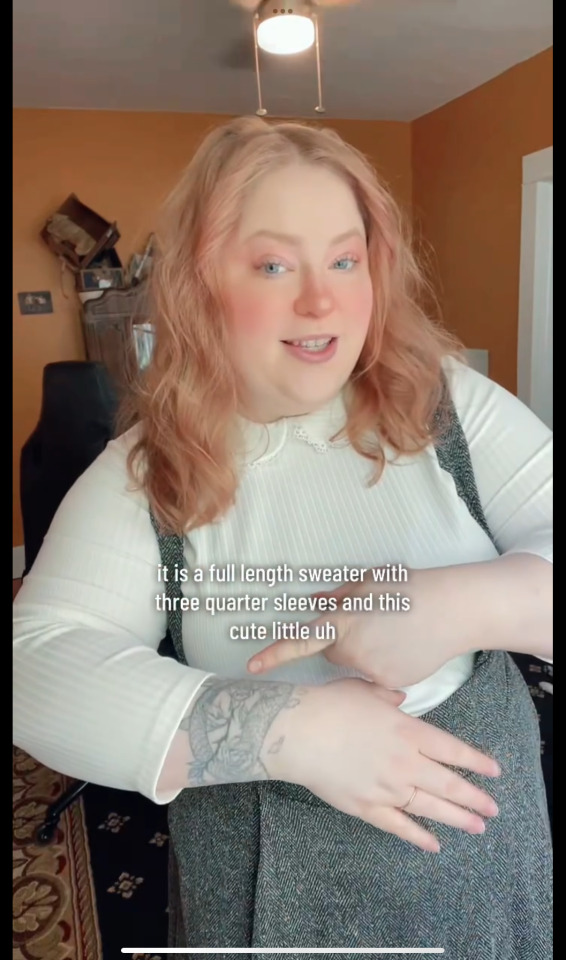
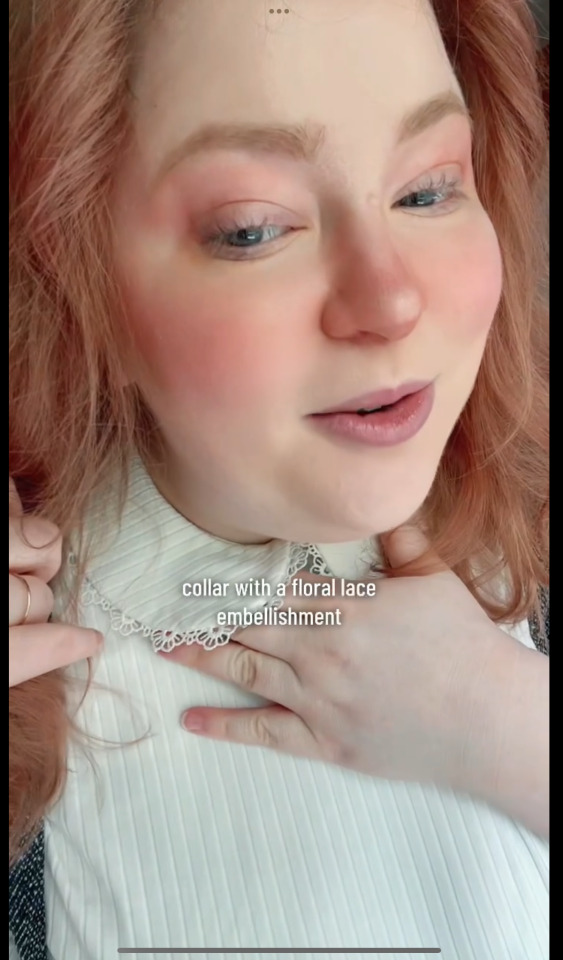
2nd, i get that everyone has personal preferences, but this was unnecessarily rude. you’re not going to like every decision we make, and that’s OK, but if you’re old enough to use a credit card to buy things online, you’re old enough to realize that product decisions you dislike were not made to personally gall you.
there were a few reasons we chose to do 3/4 sleeves, but the primary reason was that 3/4 sleeves work better for a variety of arm lengths. a 3/4 sleeve will look good whether someone’s arm is shorter or longer than average, whereas a full length sleeve can easily be too long or too short for the person wearing it. we also didn’t want to do short sleeves because at the time the only other shirt we had in production was the wrap top, which has short/cap sleeves.
we do have some full long sleeve shirts/sweaters in planning/in production that we have not shown off yet, but currently we do not have plans to make a long sleeve version of this particular sweater because we have no idea what sales will look like. if these sweaters sell well and there’s considerable customer demand, we’ll consider doing long sleeves. if these sweaters sell poorly they will not be returning to the store, period. we are a small business with limited funds and we cannot throw infinite money at the wall.
last, the fabric composition is 62% polyester, 33% viscose, 5% elastane. we tested a lot of fabrics for this sweater, and this was the only one that felt right. its appropriate thickness (not super thin, but not super thick, so that it can easily be layered under warmer garments or worn solo without causing you to overheat), the cute ribbing, and the texture/feeling (which don’t aggravate my textural sensitivities as an autistic person with very sensitive skin) were all just right.
we’ve also done a number of wash tests and did not encounter any issues with pilling. in general, if you take good care of our garments, that is not going to be an issue from our current manufacturer, who have demonstrated time and again that they prioritize quality labor and material that is made to last. the reason shein products fall apart isn’t because they’re made of polyester: it’s because the sewing is rushed and the fabric fibers are low quality and often have a looser knit or weave, which makes them more prone to damage/falling apart on a structural level.
as for pilling specifically, pilling is actually the fabric breaking. looser weaves/knits are more prone to breakage because they are more open and cheap fabrics are often made of looser weaves, which results in more pilling. but even a high quality material can pill under the right (or wrong) circumstances. when fiber is wet, similar to hair, it is more vulnerable to breakage, and washing machines with agitators (the big thing in the middle of some washers) are really really good at breaking your fibers, thus resulting in more pilling.
anyway tldr the sweaters shouldn’t have any pilling issues if you treat them right and full length sleeves are not likely to happen but are not totally impossible.
112 notes
·
View notes
Text
Limerence I


“𝒴ℴ𝓊’𝓇ℯ 𝓈𝒸𝓇ℯ𝓌ℯ𝒹 𝓊𝓅 𝒶𝓃𝒹 𝒷𝓇𝒾𝓁𝓁𝒾𝒶𝓃𝓉, 𝓁𝒾𝓀ℯ 𝒶 𝓂𝒾𝓁𝓁𝒾ℴ𝓃-𝒹ℴ𝓁𝓁𝒶𝓇 𝓂𝒶𝓃”
Office romance? (this is pure self-indulgence)
Themes: A very petty jealous older man, negative emotional literacy, porn with plot?, assistant reader who loves being a brat

The rain pattered against the window overlooking the sprawling cityscape, each droplet meandering down the glass like tears, their paths illuminated by the golden glow of the streetlights below. The rhythmic ticking of the wall clock reverberated softly in the room, harmonizing with the faint irregular beat of keyboard clicks and the gentle hum of the city alive with energy. London was breathtaking tonight, its lights scattered across the horizon like shards of diamonds against the velvet darkness that embraced it. The traffic below flowed like molten streams of amber, headlights weaving through the streets in a mesmerizing dance. Occasionally, the muffled rumble of laughter or the distant honk of a horn filtered up, seeping into Simon’s office like whispers of a world still turning.
Simon’s hands moved deftly over his desk, brushing through the disarray of files spread haphazardly across its surface, before returning to the keyboard, his fingers tapping out a steady rhythm. His brow furrowed in concentration; the sharp lines of tension etched across his face framed by the soft halo of his desk lamp. He glanced briefly at the time glowing on his monitor—10:19 p.m.—and his lips pressed into a thin, resolute line. The quiet hum of fatigue was beginning to tug at the edges of his mind.
With a sigh, he pushed his glasses up the bridge of his nose, his other hand raking through his short, buzzed dirty-blonde hair, the motion quick and absentminded. Then came a faint, familiar sound, the steady hiss of the coffee machine outside his office, followed by the rhythmic clicking of heels echoing down the corridor. The sharp cadence drew closer, deliberate and unhurried, until it paused just outside his door. Simon barely looked up, his eyes flickering to the scattered papers before him as three soft, deliberate knocks broke the silence, each one resonating in the stillness like a gentle ripple in a calm pool.
"Come in," he called out, his voice clipped, and laced with an edge of tension he couldn’t quite conceal.
Simon rubbed his temples, he yearned—no, ached—for the days when the clutter of tedious reports spread across his desk was the worst of his problems. Those days were simple, almost blissful, compared to this. Because now, the pounding headache gnawing at his temples wasn’t from numbers or deadlines. Oh no, it was from that picture. That stupid, damned picture.
It had embedded itself in his mind like a thorn he couldn’t pull out. You, his sweet, ever-efficient assistant, draped in that impossibly tight dress that hugged every inch of you like a second skin. You were at a nightclub, lights flashing, music pounding, looking like temptation incarnate. And there you were, grinning—grinning—like you hadn’t a care in the world as some jackass, who clearly believed he was God’s gift to womankind, had the audacity to hold you by the waist. His hands were on you, pulling you close, his lips brushing your ear like he was whispering the kind of secrets that were meant to make angels weep and Simon’s blood boil.
God, he hated that picture. Every cursed detail of it. The way the dress clung to you, outlining curves he’d done his damnedest to ignore during office hours. The way your smile lit up your whole face, carefree and dazzling, a smile he never got to see in the fluorescent haze of the office. And your eyes, sparkling, alive, brimming with joy, a kind of joy he realized, with a sharp pang, he’d never been the cause of.
And yet there you were offering it to him. That absolute wanker, with his arm slung around you like he’d won the lottery. He wasn’t even trying to play it cool, no, that sleazy bastard had shown up to a nightclub wearing his high school football jersey. A football jersey. What kinda tool does that?
(And for your kind information love, the moron looked like he peaked junior year and had been coasting downhill ever since. No, Simon was not being petty, okay… maybe just a little. But god Love, you could do better than that, he thought. Hell, he could treat you better than that. Not that he’d ever say it. Probably. Maybe.)
The heavy mahogany door to Simon’s office slid open with a soft groan, revealing you as you stepped in with effortless grace. The sharp click of your black stilettos echoed against the polished marble floor, announcing your arrival before the rich aroma of freshly brewed coffee did. The steam swirled in delicate tendrils above the porcelain cup on the tray you carried, curling and dancing in the cool air.
You looked like a damn vision, poised and professional, yet maddeningly alluring. The black sheath dress you wore hugged you just enough to tease without crossing into scandal, its hem skimming your knees. Sheer black stockings added an elegant finish, drawing a sharp contrast to the soft chaos of your loosely pinned hair. A few stray strands framed your face, almost as if daring to defy the order Simon demanded from everything around him.
“Your coffee, sir,” you said smoothly, your voice steady as your gaze met his. Those caramel eyes of his, always so intense and searching, had a way of stripping layers off people without warning. And yet, you didn’t flinch. Not outwardly, at least. Inside? Well, you’d learned to hold your breath and pray he didn’t notice.
He gave a curt nod, wordlessly gesturing for you to approach, his eyes flickering to the clock on the wall. 10:20, sharp. Of course. The man could probably set the national standard for punctuality. Time wasn’t just money in Simon’s world, it was religion, and woe to anyone who didn’t worship it with the same fervor.
You stepped forward, carefully placing the coffee on his desk, just within his reach but far enough from the precarious sea of reports. Precision was everything with Simon, and you’d learned that the hard way. God forbid a cup of coffee jeopardize the sanctity of his paperwork… there’d be a funeral, and it wouldn’t be for the coffee.
Working for him had been nothing short of a boot camp for the corporate soul. Demanding? Check. Intimidating? Double check. He was terrifyingly intelligent, sharp as a blade, and as subtle as a hurricane when pointing out flaws. It had taken you two grueling years to master the art of being his assistant. Two years of meticulous note-taking, clockwork scheduling, and developing a superhuman resistance to both his criticism and his occasional bouts of unintentional charm.
Some days, it felt like you were training for a military operation, precision drills, mental endurance, days that bled into nights without a chance to get some shut eye and a sixth sense for danger. But hey, at least there were no grenades... Minus the occasional friendly fire and his temper, which could definitely level a room when provoked.
You stood rooted in place, watching as Simon lifted the mug and took a deliberate sip. His jaw ticked, the faintest sign of some inner turmoil—or, knowing him, hyper-focused scrutiny. Perfect, He thought bitterly. Of course, the coffee was exactly how he liked it. You’d mastered the formula down to a science because God forbid his caffeine be anything less than sublime.
His eyes slid off the glowing screen, cocking a single eyebrow at you. The look wasn’t hostile—just a silent, borderline smug inquiry: Why are you still standing here?
"It’s 10:20, sir," you said, the words measured, your tone laced with carefully restrained patience. His deadpan stare didn’t budge, so you pressed on, plastering a smile so tight it made your cheeks ache. "On a weekend."
He blinked, his expression giving nothing away except maybe mild amusement. "I am aware, love," he replied, his gravelly tone low and deliberate, like velvet lined with steel. And damn it, you ignored the tingles the word love sent down your spine, forcing yourself to focus. Not the time.
"You updated the company policy to prohibit overtime," you added, your tone sharpening just slightly. "Specifically for weekends." You held his gaze, silently begging the man to connect the dots without turning this into a battle of wills. If he noticed the exasperation leaking into your professional façade, he didn’t let on. Instead, he leaned back in his chair, those infuriating caramel eyes darkening as he folded his arms, the very picture of nonchalance.
"And?" he fired back, the single word sharp enough to slice through your remaining shred of patience. Your left eye twitched involuntarily. Oh, how you wanted to throttle this man. Just one good shake for catharsis.
It wasn’t just today; he’d been pushing every button you had all week, barking orders like a drill sergeant and tossing near-impossible demands like a child who just discovered confetti. At first, you thought it was the stress of the upcoming board meeting to appoint the new chairman. Then you figured it might be his younger brother, Tommy, stirring up trouble and ending up on the tabloids as usual. But neither of those theories fit. No matter how much you analyzed it, you couldn’t pinpoint the cause of the extra hostility radiating off him lately.
Now, here he was, staring you down, almost daring you to push back. You clenched your jaw, suppressing the violent urge to snatch that mug and dump its contents over his perfectly disheveled blonde hair. Stupidly hot, insufferable man.
Yes, Simon had updated the company policy—one of the rare times he’d broken from his ironclad routines. And he’d done it for one reason: you. He still remembered the sheer, gut-wrenching panic when you’d collapsed in the middle of his office like a marionette with its strings cut. One moment you were rattling off meeting agendas, pen poised and professional as always, and the next, you were on the floor.
He hadn’t known what to do at first, standing there frozen like some idiot until the chaos kicked him into action. The doctor’s verdict? Exhaustion. The kind that came from months of living off caffeine, minimal sleep, and the stress of chasing after him. When Simon had grilled you afterward—because, of course, his solution to any problem was interrogation—he realized that his workaholic tendencies had bled into your life. If he didn’t eat until his stomach growled like a feral animal, neither did you. If he slept four hours a night to hit deadlines, so did you. And when had you last had a weekend off? You couldn’t even answer.
That night, Simon Riley, master of meticulous schedules and the sworn enemy of "unproductive time," made a choice. He dragged himself kicking and screaming into the savage, almost sacrilegious concept of… weekends. Two days of forbidden indulgence. Two days where work emails were outlawed, deadlines paused, and—God forbid—people rested. It was barbaric, but he did it. For you.
But now? Now?! Those precious hours he’d given back to you—the ones meant for sleep, self-care, or literally anything healthier than the grind—had been spent entertaining some overgrown frat boy with the audacity to wear a football jersey to a nightclub (yes, he is still stuck on that because come on man!). Was Simon being petty and irrational? Yes, one hundred percent. But he didn’t care. Because you brought out a side of him, he didn’t know he had—needy, childish, and so starved for your attention it was almost embarrassing.
And in his emotionally illiterate brain, forcing you into overtime tonight seemed like the only logical solution to his problem. If you were stuck here, sitting in his office, working late, you couldn’t be in that idiot’s arms. It wasn’t his proudest plan, but it was effective. Probably. Maybe. Whatever. Shut up, he didn’t need a therapist; he needed you to not smile at that guy ever again.
You swore that coffee mug was practically whispering to you, daring you to pick it up and accidentally redecorate his pristine imported Armani suit, the one crafted from Italian silk so luxurious it probably came with its own security detail. If only you could afford even a single thread of that fabric, you might have done it already. But no, your bank account had other ideas, and so did your sense of self-preservation.
“And…” you began, your words strained as you forced your smile to stay intact, though it felt more like baring teeth at this point, “why are we still here?”
Your tone was polite—just barely—but the edge beneath it was sharp enough to cut glass. You knew for a fact that after he’d run you ragged all week, there was next to nothing left to do. He’d had you sprinting between meetings, juggling tasks like some overqualified circus act, and practically rewriting the entire company’s future. By Friday, the work you’d tackled could’ve been enough for three assistants.
Which meant the only thing keeping you here now was him. Simon Motherfucking Riley. The man who apparently believed productivity wasn’t just a virtue but a way of life. Or maybe, you thought darkly, he was doing this for sport. Watching you squirm was probably the highlight of his day.
But no, that couldn’t be it. Not with the way his eyes flicked to you, it was not his usual sharp, assessing look, but something else entirely. You could almost feel the gears turning in his head, though whether they were driving logic or chaos was anyone’s guess. Whatever it was, it certainly wasn’t work-related. And if this wasn’t an abuse of power, you didn’t know what was. Yet, here you stood, holding your tongue, because despite your most vengeful instincts, you couldn’t quite justify the cost of spilling coffee on a suit that probably cost more than your rent.
"The MacTavish Project report needs to be redone," Simon finally said, his tone maddeningly calm, as if he weren’t upending your entire evening with a single sentence. Forget the coffee—you might as well hurl him off the building at this point. The audacity of this man.
"Sir," you began, incredulity dripping from every syllable, "you personally reviewed most of it and approved the draft on Wednesday." Your tone was tight, caught somewhere between disbelief and outright exasperation. Simon Riley was demanding, yes, but unreasonable? That was new, and you didn’t like it.
He arched a single, bemused brow, leaning back slightly in his chair like he had all the time in the world. "And now," he said smoothly, as if it were the most reasonable thing in the universe, "I’ve changed my mind. He’s a very important investor, and I won’t present a plan that’s anything less than perfect."
Your hands twitched at your sides, itching to wrap around his perfectly sculpted neck and give it a squeeze… not lovingly. You could almost picture it: caramel eyes rolling back, a little choking sound—pure bliss.
Would that be a crime? Yes. Would it be worth it? Also, yes.
Simon, of course, didn’t miss the obvious annoyance flashing across your face. You didn’t even bother trying to hide it at this point, and that only seemed to amuse him further. The faintest twitch tugged at the corners of his lips, softening his usual stoic expression. He liked it—no, he loved it. Loved seeing those little sparks of rebellion in your reactions. It was as if your defiance was some personal reminder that you didn’t see him solely as a cold authority figure, but as something... more human. Familiar, even. And God help him, that idea thrilled him more than it probably should have.
Yup. Something was definitely wrong, and it sure as hell wasn’t your work ethic.
"Sir, if I may speak freely?" you asked, your voice tentative but firm, despite the tension hanging in the room. You paused, waiting for the inevitable flick of his hand that granted you permission to continue.
Simon obliged with a small, dismissive wave, his eyes not leaving yours.
"Is something bothering you? And please don’t tell me it’s the McTavish report—I know it’s not. You’ve been more stressed than usual all week, and I was wondering—"
Any trace of playfulness on his face evaporated. His jaw tightened, sharp enough to cut glass. "There isn’t. And even if there was, that would be none of your business," he snapped, his tone curt and laced with an unspoken warning to back off.
But if there was one thing you were terrible at, it was acknowledging glaring red flags. And being scared of your dictator of a boss? Not your style.
"I’m your personal assistant," you countered, crossing your arms and meeting his glare head-on. "It’s well within my rights to know if something’s going on that makes you feel compromised at work. And even if it wasn’t in my job description…" You softened your tone, the edges smoothing as you gave him a look you hoped was reassuring. "I care. You’re not just my boss."
You paused, letting the weight of your words settle. Simon’s heart did something it absolutely shouldn’t have…it skipped, then soared like it had sprouted wings. For a split second, he was flying above the clouds, your words buoying him up with their warmth.
"I like to think you’re my friend," you finished, offering a small, sincere smile.
And just like that, Simon plummeted back to earth. No, not just to earth—straight into a concrete floor of reality at full speed.
Friend? His mind screeched to a halt. FRIEND?!
His honeyed eyes darkened instantly, any fleeting warmth vanishing into the void of his rapidly dwindling patience. The shift was so abrupt it left you blinking in surprise.
"Listen here, little girl," he spat, each word dripping with venom, his tone cutting and harsh. "I am not your fucking friend."
The words hit like a slap, sharp and unexpected. Simon Riley was an enigma, a man of few words and fewer emotions, but it was impossible to mistake the offense etched into his glare.
And then, like a bolt of lightning, it hit you. Why would calling him a friend bother him so much? Unless… No way.
Your hot, scary older boss wasn’t pissed because of the sentiment.
Your brain scrambled to connect the dots, a thousand thoughts tumbling over each other like dominoes. Was he—no, surely not—pissed because you’d called him a friend when he... wanted to be something else?
No way.
No freaking way.
And yet, the simmering storm in his eyes said otherwise.
Your sigh filled the room, heavy with restraint. Sure, your conclusion about Simon’s reaction was just a working theory, and blurting it out without concrete proof would be the equivalent of signing your own professional death warrant. Instead, you pulled your composure back together, arms still crossed beneath your chest as you nodded curtly.
"My apologies for overstepping, then, sir," you said, your tone measured yet laced with a faint edge of provocation.
Simon almost groaned out loud, internally cringing at his earlier outburst. What the hell was that pathetic display? he berated himself. Clearing his throat, he reached up to loosen his tie, his fingers tugging at the fabric as if it were choking him. He forced his voice into something softer, more even.
"I... didn’t mean to snap," he admitted, his usual cold edge finally giving way to something more human. "You’re right—I’ve been a bit stressed. But it’s nothing to be concerned with." He paused briefly, his caramel eyes flicking to yours before adding, "Although… I appreciate the sentiment."
There it was. The Simon Riley you recognized, the stern, unyielding leader who cloaked his rare moments of kindness behind layers of frost. He wasn’t an easy man to read, but he always found subtle ways to look after the people under his wing, no matter how gruff his demeanor seemed.
And then you gave him that look. That damn look.
The one that pierced right through his icy armor, as if you could see beyond every wall he’d meticulously built over the decades. Your eyes, those dazzling windows of allure, struck a chord deep within him, one he couldn’t shake no matter how hard he tried. Every time you spoke, every time you looked at him with that mixture of concern and quiet defiance, it was like someone had poured kerosene over his carefully contained fire.
And now it raged uncontrollably.
His gaze lingered on you a second too long. He swallowed hard, his thoughts slipping into dangerous territory. How would those eyes look if they were gazing up at me? he wondered, a traitorous part of his mind conjuring images he had no business entertaining. He could almost envision the sparkle of your tears, the way your lips would look—swollen, red, and glistening—after wrapping around his cock, choking and gagging as you struggled to—
Stop.
But it didn’t stop. The image of you on your knees, looking up at him with a mix of surrender and defiance, burned into his mind, fanning the heat pooling low in his abdomen. His arousal throbbed behind the tailored fabric of his suit pants, the sharp sting of his zipper brushing against his hardening length. This was what you’d reduced him to—a man who prided himself on control now undone by the mere thought of you. He was a goddamn hormonal wreck, unable to stop his mind from wandering to how your lush curves would feel bent over his desk, his hands gripping your hips as he—
Focus, he scolded himself, shifting slightly in his seat to hide the evidence of his betrayal. This was insanity. You were his assistant. He was your boss. But as he looked at you again, he couldn’t deny the truth that lingered in the dark recesses of his mind.
You had him, hook, line, and sinker, without even trying.
This is what you’ve done to me, he thought bitterly, shifting to disguise his growing arousal. Reduced to a hormone-riddled teenage boy, he was powerless against the storm you stirred in him. The image of you laid out on his desk, your body framed perfectly against his as he forced your thighs apart and ploughed his aching cock deep into you,, was burned into his mind, refusing to let him go.
And God help him, he didn’t want it to.
˖⁺‧₊˚♡˚₊‧⁺˖˖⁺‧₊˚♡˚₊‧⁺˖˖⁺‧₊˚♡˚₊‧⁺˖ ˖⁺‧₊˚♡˚₊‧⁺˖˖⁺‧₊˚♡˚₊‧⁺˖
Bruh, this is the first time I am writing on Tumblr cause this man has been the bane of my existence for the longest time and it is a crime that Simon Freakin Riley reimagined as a CEO is not mainstream cause let's be real ... mans gives heavy daddy dom vibes… y'all I am just going to put this one out here for now and hopefully upload the smut part of things by next week... ૮꒰ ˶• ༝ •˶꒱ა…
#CEO! Simon riley#simon riley#older!boss simon#fempov#simon riley x f!reader#cod mw2#simon riley smut#simon ghost riley x reader#ghost cod#ghost x y/n#simon ghost riley#cod ghost#cod#oldermen#ghost x reader#simon riley imagine#simon riley x reader#simon riley x you
46 notes
·
View notes
Text

PSYCHODUNGEON is out now physically and available to purchase from the Rat Wave Webstore. If you missed out earlier this year nows you're chance to grab the GMless mindscape dayjob dungeoncrawler that everyone's talking about.
(also there's now a deal on the site where if you email me a receipt of a digital purchase I'll offer you a 15% discount off the relevant book)
"PSYCHODUNGEON is a post-Blairite, post-Dungeon, modernist nightmare laced with hope. Imagine if the adventuring party sent to accompany you into the labyrinth spawned from your traumatic past are employed by the same company who decided to skimp on COVID protections for their care homes as it made more money than ensuring nobody living in them died, and overseen by the government department tasked with making sure nurses are as overworked/underpaid as possible. Sure, this band will try their best to help (most of the time). But also, their lives are hard as fuck. They are gonna be messy and imperfect and it is going to get weird somewhere along the line. Truthfully, I'm surprised this game didn't first appear as a strip in 2000AD." - Tanya Floaker (The Connection Machine, Solstice, Be Seeing You)
"PSYCHODUNGEON does what some of the best Belonging Outside Belonging games do, which is create a setting that is a powerful mirror to our own, and then weave that setting into the very marrow of the game. The setting, its dungeons, clients, and psychoplumbers are inescapable in the best way possible because you don’t want to escape it. You want to dive in and see and feel everything that the postdungeon city of Glyndain has to offer. And then come out the other side changed by the experience." - Josh Hittie/Ostrichmonkey Games (Vibe Check and DEATHGRIND!!MEGASRUCTURE!!)
"PSYCHODUNGEON is one of those rare gems of a game that are at the same time strong death-of-capitalism critique and interesting dungeon delving. Most importantly, the way characters are very much not-ok is fresh and stimulating. I want to go and be not well in a psychodungeon." - Paolo of Lost Pages
35 notes
·
View notes
Note
hello, are you still doing requests?
if so, could i have some sibling headcanons of nico with a hades kiddo that's really peppy and into colorful things and people find it hard to believe they're siblings at first because their personalities are polar opposites of each other?
thankyou!
Heya, I'm still doing requests but I have so many so it might take a while to get an answer, feel free to request something else though! This kind of went off track but oh well <3

Don't take it to heart---Nico/opposite aesthetics sibling!reader
»»————- ★ ————-««
-The minute you skipped up to the porch of the Hades Cabin with your stripey rainbow leg warmers and a tote bag with a stupid pun about a show with something called ‘carebears’, Nico winced.
-He’d need sunglasses if he had to keep looking at you, but he didn’t really want to borrow the big yellow star ones on the end of your nose, so maybe that was a bad idea. Your first interaction went a bit like this:
You: “Heya, you're the emo kid, right? I’m new! So, where’s our cabin?”
Nico: “Uh… you're supposed to go that way.”
You: “No, that’s the Iris cabin, at least that’s what Chiron said. I’m your new sibling, by the way. Chiron said we have one in Rome too!
Nico: I- well, yes, I- we do.
You: Are they as grumpy looking as you?
-Needless to say you got off to a great start. Nico proceeded to dump your bags on one of the beds, which has a zebra print doona matching one of your headbands, and then left immediately. You shrugged it off, obviously, and started stacking your things on the coffin shaped bookshelves. You ignored the candle that was supposed to smell like ‘the souls of the damned’, and put your own flowery one next to it.
-You found out you loved arts and crafts, where you made friendship bracelets with Lacy, as well as pegasi riding. You saw Nico once, and he waved awkwardly, but went back to the small child he was glaring at quickly. You quickly became attached to a creamy coloured mare called macaroni as well, but Butch wouldn’t let her sleep in your cabin. He did take a friendship bracelet, though. And he let you weave daisy chains into macaroni’s mane and tail, so you liked him.
-You had brought a musty old record player with you after finding out that there was no wifi, but you had to pause ‘Washing Machine Heart’ [by Mitski, of course] when Nico came trudging into the now bright cabin. You’d opened all the curtains and taken the spiders that fell from them outside, dumping them in the bushes behind the Athena cabin.
-Nico stared at the squishmellows on your bed and then the dreamcatcher by one of the windows, and the row of brightly coloured converse with striped laces lined up by his three different pairs of black Doc Martens.
-He shrugged his jacket off and went straight into the bathroom, leaving a little trail of muddy footsteps along the heart shaped rug you’d put down.
-He was just adjusting to a roommate, you told yourself. It wasn’t anything to do with you personally. You hadn’t done anything wrong, maybe you should just give him a bit of space. That was a good idea. Leave him alone for a bit until he was used to you, and don’t take it to heart.
»»————- ★ ————-««
-You took it to heart.
»»————- ★ ————-««
-Months had passed, and you were thankful for the Ipad Piper [she was so nice, and she let you borrow her Olivia Rodrigo records] lent you so you could facetime the family and friends you had left behind occasionally. They had seemed to adjust to you not being there anymore, now that you knew you were a child of Hades, the outside world was too dangerous to risk. You tried not to take that to heart either.
-Macaroni was getting used to the beaded bridle you’d made her, but you were still training her to get used to flying around while you used your new weapons.
-Nyssa had helped you make them, able to actually craft a design after glancing at you scribbled drawing with glitter gel pens that you really had worked hard on. Now you had a sparkly belt with three attachments, that you could click in your spray cans too. The cans were filled with different coloured paint, only the base liquid was melted down celestial bronze flakes, so when you fought a monster, which you were still learning to do, it would seep into their eyes and turn them blind, or crack through their skin and dissolve them. You loved the spray cans.
-Drew had warmed up to you as well, and you were even invited to Barbie premier night in Cabin ten. You got to wear your sparkly leg warmers and the cropped leather jacket in a light shade of pink.
-You were making your way to the arts and crafts center with a box of clay and little paint brushes in your arms to run the pottery class [you’d been elected as head of arts and crafts pretty quickly, shared with Elsa, one of the Athena kids who specialize in weaving and sewed the cutest pajama pants] when you bumped into Nico.
-Literally.
-The box may have been a few heads taller than you, so it wasn’t really your fault, but Nico still snapped at you.
-You gathered up the little tubs of paint from the grass and apologized quickly, your chest tight with anxiety. You hurried away after that, ignoring your brother as he tried to explain he hadn’t realized it was you when he hissed curse words Drew had started teaching Harley and Lacy.
-The class went well, the scrunchies Elsa was making her girlfriend for her birthday went along well, and a few more kids than usual showed up, taking lumps of clay from the tray and working it into figures on their tables. You were making beads that you’d string onto a bracelet for Nyssa, because she always broke the plastic ones with hammers and drills accidentally.
-You thought back to your interaction with Nico and regretted it dearly. Maybe if you’d just heard him out or even apologized and blamed yourself, he might’ve come to your class to see your works, or sat with you at dinner, or even just waved from across the infirmary when you went to get panadol for your headaches.
-You knew you got them from straining your eyes to read and draw in the dim cabin, but whenever you opened the curtains or switched on your blue lamp with a cloudy pattern that you hadn’t got to use yet, Nico cleared out completely.
-It wasn’t your fault, you reminded yourself, you were just… too different.
-People started filing out after putting their creations to the side, you complimented each of their idea’s even though you felt like getting some Ben and Jerry’s from the camp shop and curling up in bed to watch ‘10 Things I Hate About You’ again.
-The beads for Nyssa were nearly done, so you went to find a container to pop them in.
-When you got back, they had been ground into the bench until the delicate tracing of different things Nyssa likes were just shapeless brown blobs. An Ares kid, Grey, was standing with their arms crossed and a smirk on their face, which was mostly obscured by a nose that had been broken too many times.
-You stared down at the squashed clay and felt your eyes prickle with tears.
-Grey jeered at you, calling you things you’d rather not hear again, because they only made the tears fall. You rubbed your nose and smoothed the front of your tye-dyed camp shirt flat. Grey called after you, something about being a ‘rainbow prissy’. You stumbled out of the center.
-Nico wasn’t in your cabin when you slammed the door behind you, thankfully, and you hopped into bed, kicking your yellow converse off and pulling the doona over your head so you didn’t have to look at the skull filled walls around you.
-It was so dark, it was so dark and shadowy and there were bones you were too scared to ask about their origins lining the mirror in the bathroom you kept seeing things behind you in. Your crocheted blanket that used to sit across the black doona cover had been folded up a while ago and placed back in your suitcase, along with a few of the more multicolored posters and the fruity scented candles that seemed to annoy your half brother.
-You rubbed your eyes with your sleeves and held your hand over your mouth so Nico wouldn’t hear crying when he would eventually come back a few hours later, late enough that you could pretend to be asleep.
»»————- ★ ————-««
-The infirmary was busy with bleeding and laughing demigods when you wandered in looking for some panadol. Your headache was making it hard to think straight, but whenever you cried too much you got one, so you knew what to do by now.
-Will waved from over from where he was pulling a ruler, a stapler, and a glue stick out of the stomach of an Iris kid who was giggling the entire time, coughing up glitter. He grimaced when a chunk of glue hit his face. You waved back and turned the corner, heading to the rooms at the back where Austin would be. He usually had the panadol.
-Someone groaned in the corner, and you spotted Grey.
-They looked like a soggy bag of a human, their mauled nose the only definable shape. You couldn’t pull your eyes away from the grotesque demigod blob.
-Austin shuffled up behind you with a grimace, passing over a few pills and a glass of water without looking away. You gulped them down quickly as Grey let out another moan and rolled a bit on their hospital bed. Austin told you that he’d been spotted on the floor of the Arts and crafts center.
-Apparently, every few minutes one of his bones would disappear.
-It was only a few fingers at the start, then most of his ribs couldn’t be found and there was something wrong with his mouth, which Austin found out meant his jaw had decided to not be there.
-A screechy sound came from the front of the infirmary, and you both looked to the door, which Clarrise was dragging Nico through, holding him up by the back of his jacket. He pummeled at the chunky daughter of Ares, but couldn’t get out of her grip. Clarrise glared around at the staring demigods and snarled, “why is this little shit de-boning Grey?”
-You didn’t know who yelled ‘that’s what she said’ from across the room.
-”Because they deserve it.” Nico hissed a bit like a cat, glaring up at Clarisse with narrowed brown eyes underneath his floppy hair.
-Will ran up to the pair, brushing glitter off his gloved hands onto his scrubs instead. He folded his arms and stared Clarrise down until she finally let go of Nico, who dropped to the ground and then sprung back up, wrinkling his nose at the daughter of Ares, who just stuck her tongue back out at him.
-Will pinched his nose, “Clarisse, more people come in here because of you then Nico, so you don’t get to talk. Nico, just fix them, they’re too annoying to be kept in here.”
-”But people deserved to be punched by me,” Clarrise argued with a scoff.
-”And Grey deserves to lose their bones!” Nico shot back, glaring up at Clarisse and balling his fists, “they stepped on my siblings clay stuff!”
»»————- ★ ————-««
-You yawned and stretched your arms out above your head, then blinked up at the roof with bleary eyes. The skulls were gone, now it was just black concrete. You rolled over a moment later and stuffed your head back into your pillow, pulling your crocheted blanket back over your head.
-There was a ‘shing’ sound as curtains were yanked open, and you just sunk further into your comfy bed, ignoring the bright beams of early morning sunshine that streamed in and lit up the dark cabin. It made the rainbow rug in the center of the cabin even brighter, and you groaned loudly in protest. “Whaddaya even doing up so early? Go back to bed you vampire!”
-”It’s only six am?”
-”You’re more of a psychopath then I thought before,” you muttered, but made sure you were loud enough that your brother could hear you as he padded round the cabin getting changed and ready for his much too early start to the day.
-Nico huffed and the bathroom door shut as he completely ignored the hairbrush you’d given him to passive aggressively deal with his scruffy black hair. “Leo forgot the code to the safe in the big house that he changed when he was hiding those icey poles from Piper.”
-”And how are you supposed to help him remember?”
-Nico’s boots were loud on the floorboards as he trotted over. He kissed you on the forehead gently, “oh I’m not, I’m gonna go watch him suffer the consequences with Jason.”
»»————- ★ ————-««
#pjo fandom#heroes of olympus#pjo#percy jackon and the olympians#percy jackson#nico di angelo#nico di angelo x sibling reader#nico di angelo reader#child of hades reader#child of hades#hades cabin#Jasico#Jason grace#jasongrace#Will solace#clarrise la rue
310 notes
·
View notes
Text

You always thought the circus was where you yearned to be. At least, until it finally let you in—and introduced you to Hanta Sero.
[circus AU where seamstress!reader and acrobat!sero realize that their lives have been running parallel for a long time, and it’s up to you to weave them together]

part 2: veiled by the daytime sky.
sero hanta x reader ch 2/6 | 11.4k words | masterlist | ao3 cw: slight spoilers for the war arc/fights if you squint notes: ch songs are birds of a feather by billie eilish, saltwater room by owl city
you watch the circus performance of a lifetime.
✰.
"It's all so familiar yet I know I've never been here before. I feel so at home."
-Sophie, from Howl's Moving Castle

You wake up in your own home.
Despite the excitement and thrill of the night, the buzzing through your body came to a halt when your dance with the stranger ended. You tried, gave a valiant effort to continue, but your heart felt heavy. You were missing something—a partner. In an attempt to sooth your melodrama, you purchased another round of taiyaki, hoping to suffocate your delusions with the fluff of pastry and dense red bean paste. When that failed, all you felt was the pull to be home, comfortable in your bed. You heeded Chiara’s offer and took the metro home, ignoring that you’d have to get your garment bag and box in the future regardless. Then you took the train back, showered your fastest shower, and laid in bed curled around your precious book, fingers threading through the pages. It felt more real, somehow, after running into that man.
You turn over in your bed, squinting at the morning light crawling through the room. You blink a couple times, trying to smear your vision to clarity as you notice the grey of the sky. When your focus sharpens, you catch light tufts of snow gently falling.
It’s enough to have you leaping out of bed, hopping and stumbling as you untangle the giant comforter from your legs. When you free yourself you run across the room, planting your hands on the windowsill and pressing your face against the glass. Joy blooms in your chest, watching puffy whiteness cling to the pavement and grass.
You think today will be incredible.
It’s also a working day, you decide, to spend your morning on the start of your next order: another opera gown. You make your breakfast unhurried before slipping on a coat and into the garage. The door to the driveway opens with its usual squeaky greeting, and you step outside with a smile. Your hands raise, outstretched to the sky to catch the softly falling snow. You tilt your head upwards, scrunching your nose when a bundle of flakes lands on the tip.
It takes a while for you to start working, first pulling out sketches from the meeting with your client. You spread them across your work table, shoving unnecessary ones aside, some of them falling to the ground. Next you scan them for the measurements you jotted down, outlined with a bright yellow square. Notes for colors and textures are scribbled underneath, with a crude sketch of lace swirls. You rummage through your rolls and scraps and samples, looking for fabrics that match best. You take a picture of three similar options, asking your client for her preference. You set an alarm before switching off your phone and pulling out the dress pattern, to start on the bust.
You work steadily, taking your time to cut and pin swathes of sapphire blue. Next you sew, listening to the comforting hum of the bouncing needle, your hands gliding smoothly beside it. These movements are technical, practiced, running on muscle memory. You are another type of sewing machine, one that measures and cuts and hems, one that will later embroider and meticulously weave details into the fabric—but you are still another machine, in the end.
It’s easier to work on autopilot somedays, like today, when you’re still trying to grasp that your last project came to an end. You have different fabric in your hands—no longer fiery red and blood-maroon. You’re cradling a different story, a new client, a new destination. But you work as per usual, going through the same motions, the same patterns, the same focused, uninterrupted state of concentration.
The air is chilly, biting against your hands and seeping through your jacket. But you leave the garage door open, soaking in the light diffused through clouds, the crispness of winter flavoring your work. Stray flurries breeze into the room, greeting you for a moment before they unravel into small puddles on the concrete.
A soft smile sits on your face as your mind wanders. You love winter, the coldness initially foreign and villainous when you arrived in Italy. You’re used to the tropics of Costa Rica—hot, humid air and black sand beaches, crystal blue water with the warmth of a hug. You hated these wet winters and the dry heat of Milan summers, how they deepen your ache to go home. But you’ve come to love the new layers of your seasons, the arrival of one always blooming excitement for the next.
But your hands go numb, and you have to close the door.
The alarm sounds, pulling you from the depths of your focus. The last piece of fabric slides through the needle before you lift your foot from the pedal, to halt the machine. You swipe your thumb to end the alarm before briefly scrolling through your notifications. Your client responded with her preference: a thin and lacy fabric, the one you’re almost out of. You make a note to pick up another bolt today.
You don’t bother with cleanup, leaving scraps of fabric and papers and spools of thread across the surface of your table. Instead you stand and stretch out your arms, rolling your shoulders beneath the heaviness of your coat. There’s an ache in your neck from hunching, worsened by the stiffness from the cold.
Dressing today is a rare challenge. Normally it’s a sequence of intuitive decisions, hardly a thought entering your mind when you toss on garments. But today is special; today is the first showing of Gōyoku—the first production by Hoshi no Sākasu that you get to see, and with your first costume in a circus production ever. You didn’t expect to feel this indecisive, with uncertain hands carding through your closet and drawers, nothing catching your eye. You pout at your lack of inspiration.
A flicker of feathers catches your eye, glimmering like a wave from the back of the closet. You pull the hangers aside to reach for it, frowning in confusion. When you manage to pull it from the rack and hold it in the light, you laugh. It’s a long piece, the fluff and volume of a black feathered boa. The thought that crosses your mind feels impulsive, sabotaging even, but you’re already giggling at the thought of wrapping yourself in it. Your mind races with possibility: a flapper dress, blazers with giant shoulders, giant sunglasses. They’re re-entering the fashion scene, appearing on the streets with skin-tight dresses, but you want something more casual.
You settle on creamy linens, white with the faintest touch of warmth. They sit heavy on your skin, thick enough that you consider going coatless. Knowing you’ll be cold, you snatch a matching coat to settle on top. After looping your star garment around your neck, black feathers stark against smooth fabric, you turn to the mirror and laugh. Chiara would groan if she saw you, but you work in costume before fashion. Looking ridiculous is part of your job.
You take your time entering the city, leaving early to stop by a bakery and fulfill your craving for panzerotti—the call of fried pockets of mozzarella and tomato—buying some extras and a few different tramezzini to share. Kendou sends you a pin when you let her know that you’re close, leading you to one of the trailers behind the auditorium tent. You walk giddily, smiling at the sparse snowflakes still feathering down.
The piazza is quiet when you walk through through the main entrance, the sides now blocked from the night festivities. There are few people: stray observers and occasional staff members. The guard by the security clearance lets you through with ease. Another guard notices you straying towards a secondary fence, tracking the pin with a frown, and helps you navigate to the trailer once you offer your ID card.
You are led to a white rectangular trailer, one of three in a line. You check the pin once again before walking to the one in the center. Unsure if you should step in without warning, you knock hesitantly on the door.
Only a few seconds pass before the door swings open. You blink in surprise when you’re greeted by the man you met last night, now dressed down from his festival costume. His hair is ruffled, bangs scattered sloppily across his forehead, and his stubble is gone. You swallow as you take him in, the softness on his face, along the edge of his jaw, as wears a matching surprise. He’s flustered, but there’s a shine in his eyes as he watches you. What is he thinking, to look at you like this—like you mean something? He has an air of mystery that tugs at your heart, a yearning to ask endless questions about him, to know who he is. It’s paired with an ease that convinces you he would answer; he would tell you all you wanted to know.
You fight through your smile to speak. “I didn’t expect to see you so soon.”
He opens his mouth to respond, and you’re eager to hear it, but Kendo’s face appears behind the man’s shoulder. “Hey! You found us! Come in, come in.”
Mystery man steps aside to let you pass, just close enough that you brush his shoulder. Your mind flashes to the night before, his hand on your waist and then entangled in your own, spinning you while your wings flapped over your shoulders. You try to blink away the thought, but it persists.
You catch Momo sitting by the vanity, waving with a cheeky smile. You frown at her expression.
Kendou speaks again, gesturing to the man. “This is Sero, by the way. One of the performers.”
You nod, then smile towards him as you introduce yourself. He grins brightly, not a trace of uncertainty in his eyes. It’s a stark contrast from moments ago. Another mystery.
“Nice to meet you properly,” he says.
“Sero was just about to get ready,” Momo says. Her eyebrows are raised into her bangs, glancing towards Kendou with a look you can’t read.
You hear Sero’s voice hitch, like he’s about to say something, before he sighs. “Yeah, I was on my way out.” He looks at you regretfully. “It was nice to catch you.”
You nod, offering one of the small sandwiches from the bakery before he leaves the trailer. He takes one without looking—prosciutto, with tomato and olives and Swiss cheese—before gently closing the door. When you turn to Momo in anticipation, ready to help her into her dress for the show, you’re met with a mischievous grin. You frown again.
“What?”
Her lips twitch. “Nothing.”
You look at her expectantly, unamused, but she doesn’t budge. Kendou smiles, making you equally skeptical of her, before speaking. “We have a bird to dress! Aoyama will be here any minute with the skirt, and then we’ll get to work with your supervision.”
You nod, understanding that you’re meant to be the supporting role for the other costume artists, for them to figure out the kinks of the dress by the time they’re on the road. It’s bittersweet, to spend a few more days with your creation before it sets off without you.
A man appears shortly, noisily strutting through the door of the trailer. His outfit is entirely reflective, the iridescent shine of a CD, and you assume he must be Aoyama. You grin at the sight. Kendou is quick with the introductions. “This is Aoyama, the other costume manager. Aoyama, this is the costume artist—”
You shake hands as you finish her introduction. “It’s a pleasure to meet you.”
He winks while responding. “As it should be! I love your boa.”
You suppress a laugh. “And I love your outfit.”
“Heat transfer vinyl,” he sings, pressing a hand to his chest. “Do feel free to ask where you can purchase it for yourself.”
You laugh, telling him to give you the details later.
The air of the room shifts, everyone settling into business as Aoyama sets down the hoopskirt and Kendou pulls the dress from the closet. The trailer is surprisingly large despite being a room on wheels, offering a wide breadth for Momo to step into the frame and have the other two fuss over her. They check with you on its placement before gathering the dress. Your fingers itch to join theirs, to fix the stray bends of fabric or straighten how it lays against Momo’s skin, but the hands of the costume crew trace over those spots eventually.
When the headpiece is set in place and you get to see Momo in full costume—her hair falling in loose, long curls, eyelids powdered the same blush as her lips, an elegant jewel strung around her neck—you swallow. Seeing your finished pieces, dressed on the figures they were made for, will always clench at your stomach. It brings a rush of euphoria over you, followed by a sweeping emptiness.
You do a onceover to look for anything out of place or concerning, but they’ve laid it perfectly. Your chest both lightens and pangs. The dress will be in good hands.
“If we’re settled I think it’s time we take our star to the main room, yes?” Aoyama asks.
You nod slowly, pressing down the ache.
Kendou smiles softly. “It’ll be okay.”
“I know, I know. I have attachment issues.”
She laughs and slaps at your shoulder. “I would too. Now go busy yourself until the show starts.”
You help them pin the fabric at the back of Momo’s dress before exiting together. You stop at the back entrance of the tent to say a temporary goodbye, handing over the remaining triangle sandwiches. The crew members slip carefully through the canvas, holding the thick material back to avoid brushing against Momo. You avert your eyes, only catching a glimpse of feathered costumes drifting in the background.
The next half hour is a struggle, time passing slowly in your giddiness. You stand in the cold for the first few minutes, remembering how snow fell softly from the sky just hours prior. The sticky remainders flatten under your shoes with a soft crunch. Your mind drifts to the grueling months leading up to now, iterating the dress and the push and pull between what you, Momo, and Kendou all envisioned. The sky is still hazy, a bright white mist covering the blue buried above. You imagine a plane beyond the fog, Momo and Kendou sitting together by the window, waiting in anticipation to see your mockup in action.
You smile wistfully. It already feels so long ago, that flood of excitement and the fear of not finishing in time—hours stretching on with you hunched over the gown. It was a painful sort of urgency: the need to be finished, all the while your hands only ever moved at the same steady pace. And now you suddenly have the next step to focus on—the show for tonight, or the next gown you need to sew. Where does the time go? Is it buried in the folds of your projects, sewn into the fabric like a quilt? Are you giving your own life away when you pass on the garments—holding all those moments in their fluid spaces?
Sometimes you wonder how you got here, always moving and moving, never taking the time to look back, to reflect and connect all the pieces of your journey to who you are today. Sometimes you feel like you never made a decision, that these events unfolded on their own, little seeds that blew in the forceful wind of life, hiding in the crevices until you finally turned to look at them: sprouted and standing firm in the ground.
Too firm, too rooted, to move.
Tired of your sentiments and the creeping chill, you decide to enter the shelter of the stage tent. The main entrance is littered with people checking in, clumps that thin into long lines. A metal guardrail separates you from the ticketing to enter the tent, so you approach one of the security members to ask for help. When you show him your ticket and ID card, he leads you to another entrance, skipping the line entirely.
You reach the edge of the interior where the concessions are prepared, sandwiching the stairs to the seating. The crowd thickens as showtime approaches, the lines for food and drink quickly elongating. You’re prepared to skirt around and go directly to your seat, not tempted by the wafting scent of buttery popcorn and the sweetness of pretzels, but your eyes land on that fluffy fish-shaped bread from the night prior, and your feet take you to the line before you mentally make a decision. Luckily it moves quickly and you soon purchase two taiyaki, placed gently in a crinkly paper bag. You hold it gently, the heat spreading through your hands.
The seat number on your ticket indicates that you’re in the section closest to the front, but in one of the furthest rows. It’s the seat you requested, centered to get the ideal view and close to the stage, but slightly elevated for the best angle to view the performers. You walk unhurriedly to your spot, taking a booklet offered by the attendant in the aisle. Once seated, you run a finger over the glossy paper—the striking art of a fiery phoenix—then press your thumb against the edge of the cover to open the first page. You scan your eyes over the introduction, three separate paragraphs for the original Japanese, followed by an English and Italian translation.
Gōyoku—meaning ‘Fierce Wings’—is the action-packed story of the impossible creatures of the sky. For just one moment, in the wake of their greatest desperation, these winged beasts are able to be glorious, fiery gods. Follow the journey of a guardian hawk as it battles fearsome foes, inspires his apprentices, and eventually burns out in his diligence to protect the new generation.
You smile with anticipation. The next page contains a list of names and roles: the director, producers, and stage crew displayed in neat rows, with details written in a small font beneath the individual names. You catch Aizawa’s, the romaji bringing a grimace to your face when you once again remember your first encounter. You flip the page, eyes recognizing a list of acts, and then immediately skip to the one after. The back has a list of acknowledgements and gratitudes, to donors and inspirations for the show. You blink when you see your own name on the bottom, with a small paragraph describing your work and why you were chosen for the production. It pulls a tight smile across your face.
You close the booklet and eat one of the taiyaki.
At four on the dot, the lights dim. Most people are in their seats, some stragglers still filtering in. Your eyes trace the room, packed full with spectators. Nearly every seat is filled, a mix of ages, singles and couples and families. Your eyes widen when you catch sight of the little girl from last night, the same pinched face of her Hyottoko mask. You’re tempted to wave, to see if you can catch her attention, but she’s up in a row towards the side of the stage. There’s no reason for her eyes to swoop in your direction.
But they do, to your surprise. First in glee, excitement, and then in surprise. You look at her confusedly, slightly tilting your head. Her parents are watching you too, with the same expressions. Other people in their seats look your way. Your heart starts races, wondering what about you has grabbed their attention—
A pair of hands cover your eyes from behind, jolting you in your seat. They’re paired with a deep giggle, almost dark and maniacal. You grin in embarrassment.
Crowd work. You’ve seen the cartoonish forms of circus clowns engage with the audience before, oftentimes its own act in the show, but you’ve never been subjected to it yourself. Your heart races from the attention, anxious at being part of the spectacle. Part of you Suddenly the hands trail downwards, to your large boa, and pull it away, bringing a waft of cool air to your neck and shoulders. You blink in surprise, head turning to follow it.
You see a blond man nearly skipping down the aisle, your boa swinging in his hand. He’s dressed in a tight black suit, tipped at the wrists with tufts of feathers. The fabric of his clothes are sewn with analog watch faces, set at a variety of times. His face is obscured by a bird mask, only revealing a wide, cheeky grin. He makes a show out of floating your boa around him, posing as if he’s unsure what it is, before wrapping it around his own neck, letting out a fit of ridiculous laughter and then skipping through the seating.
You wonder if he was informed that you were in the audience, if this was planned.
Your grin spreads easily across your face, watching as he turns back with a wink before bothering other audience members. He stops by the girl, where she sits in the front row of the next section, and makes a show of looking curiously at her mask. He reaches for it and she giggles, holding it against herself in defense. The suited bird cocks his head, then pouts before sighing and strutting away dramatically in defeat.
Commotion from the other end of the room turns your head, to another figure working the crowd. This one is a bubbly woman, with a costume of bursting pink feathers and purple, shimmery patterned cloth. She wears a giant smile as she hops along the seat, looking curiously at the audience members. When her mask turns so you can see the face, you are struck by the illusion of darkness beneath her eyes, completely blacked out. A pair of sharp but narrow horns sprout from the edges, giving her an alien quality. Like her show partner, she giggles happily as she skips along.
The pair charades their way to the front, keeping the eyes of the audience focused. When they meet each other on the stage, they communicate with overexaggerated gestures and gibberish noises. The blond one does a twirl, raising his hands to bring attention to your boa with a wide smirk. The pink one gasps and reaches for it, only for the blond to huff and jump away. You watch with amusement—and apprehension, hoping your scarf will survive the show.
The sound effects of the characters start to blur into a song as they move around the stage. A light melody settles in, synchronized with their steps skirting back and forth. Just as they dart into the center, a loud bang resounds from the speakers. The characters pause, dramatically turning around the stage in defensive stances. The girl looks up and points, hopping in excitement. Her partner tilts his head, offering a polite clap with a shrug.
You follow her finger, watching as a hoop slowly lowers from the ceiling. It spins slowly, cradling a man. He’s almost lounging, lazily lying with his back on the bottom, neck cradled to the side. One leg dangles while the other is bent into the frame, foot toeing against the edge. You are close enough to see his face, the confident smile that pulls at his lips. His eyes are closed, outlined with red markings. His clothing matches his hair, golden and ruffled, white feathers accenting his wrists and ankles. He wears a transparent golden mask, open to let his expression shine through.
The music continues gently as the hoop lowers. The bird characters on the stage cheerfully try copying his pose from their standing positions, the blond shaking his head at the woman as he lifts one of her arms higher. Your eyes travel back to the lyra, to the man’s face, his eyes peeling open. He slowly sits up, trailing his arms around the perimeter of the hoop. His face morphs into curiosity as he takes in the crowd, then the birds beneath him. A sharp grin spreads across his face while he leans forward to watch them closely.
In a flash the hoop falls—you think more than his body length—and it pulls a sharp inhale into your chest from surprise and fear. The performer leans back with the movement, as if he’s going to plummet to the ground, but he catches himself with the underside of his knees. The two below shriek in fright, before scattering across the stage in opposite directions, disappearing into the back. As this new character—you assume the hawk in the booklet summary—comes to the end of his fall, he stretches his arms, reaching to catch the scattered jesters. Bright red wings sprout from his back, feathers swaying with the jolt of the fall. They’re giant, especially to have been so well concealed.
The hawk draws out the lowering of the hoop, removing one leg to fall into a split, holding his ankle by his head for the sake of showing off. Then he releases it to snake back up the hoop. His arms follow, pulling him back into the frame. He tangles himself through the edge, making a show of his flexibility, before sitting in the center. He grabs the frame below him before rolling forwards, swinging as he dangles in the air from his hands. The wings burst open once again, fiery red flaming behind his figure. The lyra is lowered enough that his feet barely skim the ground. He swims his legs through the air as if walking until he can touch the floor securely.
And then he runs.
You’ve seen aerial object acts before, always an impressive series of poses and fluid movements entangled in the air. But the speed of this act is unheard of. The performer's body swings and swipes through the air like a knife, so sharp you think you can hear the whoosh as he moves. His wings continue to open and close at the perfect times, unfolding when he holds a specific pose, lengthening in tune with his routine and the quickening music. Even when he is curled into the lyra, they compliment the positions of his body. You realize they work through a mechanism attached to his arms, opening opposite to his elbows. You watch captivated as he gracefully slides across the wheel despite his speed, all the while it glides in a circle or twirls along the rope anchoring it to the ceiling. Your stomach drops with his precarious balancing and the surprise drops, always catching himself in the nick of time.
As he slows and the act winds to an end, he pulls himself back to the center of the hoop. He nestles into another lounging position, mirroring his entrance. The lyra rises and the music lulls, signaling the end of the act. Scattered claps sound around you, snapping you from your daze. You join the applause as it rolls through the audience. It was a stunning opening, setting the stage for what’s to come.
In the midst of the clapping, the music unexpectedly fills with faster, darker sounds. As deep bass thrums through the room, three figures wrapped in black silks unravel from the ceiling. They fall in sharp, jagged movements, rocking as they tumble through the air.
They slow as they finish their descent to the floor, and then to eventually rest on the ground. The silks lift into the ceiling, leaving the performers behind. They lay still for a couple moments before twitching, muscles and joints moving in rapid and jagged jolts. Slowly they rise to stand, legs and arms angled to appear twisted. You take in their costumes, tight tan fabric purposefully wrinkled along their bodies, with small, uneven lines of feathers—one figure’s pink, one green, and the last yellow. Their masks are small on their faces, disheveled and anxious. You think you recognize two of them, the small women from the day you dropped off your dress, the ones you saw last night in the festival.
You watch curiously as they begin to struggle towards one another. They remind you of baby birds, naked and frail. Your eyes widen at the thought, putting together that they have fallen from the sky.
Their act is one of contortion, bodies twisting and bending in impossible shapes. They mold into one another, arms and legs tangling in a rolling knot. The show of flexibility is broken with a series of theatrical performances, futile attempts to fly or crawl over each other. It’s as haunting as it is awe-inspiring, striking you with distress and pity. It’s an incredible use of the act. The story is clear with these characters, their desperation for safety, for freedom. You feel sorry, yearning to offer help.
As their bodies slow in a display of exhaustion, they pile in the center of the stage. You see them breathe together, expanding steadily as one entity before compressing again. The moment is tender, intimate. Drawn out unlike usual performances. You know this is the end of the act, that you should applaud, but you don’t want to break the softness. The others in the audience seem to feel the same.
A fourth figure appears, sliding from the side of the stage and in the back. He’s tall and lean, toned stature showing through the tight fabric of his costume. It’s similarly wrinkled as the contortionists, but with a mix of purple and beige fabric. Faux scorched skin, you realize, as if stapled to itself. His costume is the least orderly, with black and red and white feathers clumped in his hair, indistinguishable.
In one of his hands is a staff, with a wheel of spokes standing from both ends. He twirls it slowly, tauntingly, as he starts to circle the bodies in the center. The lights dim as he stalks them, turned so his chest and head face his prey. The music plays eerie, sharp notes that clash with one another. Then it halts.
In an instant a flame bursts across the stage, tracing the circle of the man in purple. Your brain whirrs in attempt to understand how the act unfolded: all you can think is that his staff may have been leaking fuel along his path, unnoticed in the darkening stage. It doesn’t explain how the fire came to be, or how the staff lit itself.
The fire spinning is an act of intensity, a gut-wrenching scene of the larger figure taunting the small. He plays the role of a villain with ease, convincing even when you know it’s only for show. His body is one with his staff, rolling and twisting the length over his limbs. It runs along his shoulders and neck, twirls over his chest and through his legs, hooked over the top of his foot to be thrown back into the air. The two points of light dart throughout the stage, illuminating his face and chest and limbs for less than seconds at a time.
After one particularly fast and complex combination—topped with a downwards yank of the prop, releasing long swirls of flame into the air—you see another figure enter the stage. He has a smaller frame but a similar intensity, as though stalking towards the predator. As he nears towards the light, you realize it’s Todoroki, his split-dyed hair unmistakable. His costume is deep blue with a high collar, the exact sort of fit you imagined when you first saw him. You grin.
He suddenly thrusts himself towards the remaining streaks of fire on the ground, pressing his hand against the flame. You watch in shock, expecting him to pull away in pain, but instead the heat is smothered in an instant. The bundle of contortionists spill across the floor, writhing to the side of the stage. They continue their struggle to freedom, their jagged movements persistent as they escape to the edge of your vision.
Todoroki finishes the rest of the flames while the taller man chases him with the staff. They leap and dodge one another, a choreographed fight that involves many close calls. Your heart leaps as you watch the edge of the staff swipe close to Todoroki’s face, illuminating his sharp but delicate features. He is unmasked, the deep red of his scar visible to the crowd.
A billow of fire erupts from his mouth, shooting past the spokes of the staff and into the air. It casts a torrent of orange glow across him and his opponent, flooding himself and the burned creature in a beautiful, warm light. It shines bright enough to see the details of the stage and audience for one brief moment. You realize Todoroki was holding the fuel in his mouth throughout the entirety of the fight thus far. Impossible.
The fight continues, Todoroki and his opponent dancing with fire. It’s mostly a series of choreographed strikes and dodges, almost a game or dance as they circle one another: the staff one weapon and Todoroki’s breath the other. The flames on the end of the prop begin to wither as their movements speed, nearing the end of their performance. Todoroki closes it out with one final exhale, blowing blinding clouds of heat in an arc towards the audience. You blink back in surprise, warm air brushing against your face.
They stand in the center, bodies tense and shuddering with deep inhales. Their exhaustion plays into the reality of the fight, ragged breaths and hunched shoulders visible from afar. You think they look pained, that their struggle is beyond the performance.
The next act transitions easily, the fire show morphing into a chase with new characters—in full bird-shaped headpieces and wing-like cloaks—eventually through the air on a series of springboards soaring, twisting, flipping, and jumping propelled by each other’s landings. Two characters in particular catch your eye, with deep green and red costumes. You’re reminded of Midoriya, and think the height and frame of the green bird could align.
Your eyes widen when a giant net rolls across the stage behind the heavy duty seesaws. The fire artists slam down on the boards in sync, the new bird figures soaring. When they rise just enough to clear the net, it’s swiftly rolled underneath them to catch their landing. The springboards are then pushed out of the stage, marking an end to Todoroki’s performance.
The people at the base of the net—women in leotards, different shades of purple, paired with skirts full of feathers—lock the wheels before climbing the ladders up the side, joining the previous characters onto raised platforms. The two men untie the threads around their necks, slipping the capes from their arms and followed by the headpieces—now left only in lean pants. After setting them on the back of the platform and walking towards the edges at the center, you confirm that one of them is in fact Midoriya. The other has hair that matches his red costume.
The trapeze act should be impossible, especially with Midoriya and the redhead having just completed an entirely separate act. But it’s flawless, impeccable, unthinkable. The following acts are executed with seamless transitions that lead through a cohesive plot—a juggling act with a man who moves as if he has six arms, and a dual cyr act with men of a drastic height difference, the smaller one gliding easily and with incredible balance, and the taller spinning across the stage at incredible speeds.
At the end of their act, when the two roll out of sight, the lights and sound dim to darkness. A roar of applause passes through the crowd, this being the first real quiet gap between acts. There are cheers and hollers and whistling for several moments, an extended display of love. When the noise finally begins to fade away, a spotlight glows in the center of the stage, slowly illuminating a figure in red. You take a deep breath to ease the constriction in your chest.
It’s Momo.
In the excitement of watching, you momentarily forgot that she was performing, that you made her costume, that you’re a part of this show too.
She’s beautiful, standing tall with an air of elegance—a poise that commands the room. Behind her is a pair of feathered musicians: a purple-haired woman and an older blond man, with an electric violin and cello respectively. They draw a slow melody through the room, crisp notes floating through the speakers. Momo steps to the front of the room smoothly and carefully as if floating, the edge of her dress brushing right above the ground to cover her feet. You hold your breath as your eyes track the details of the costume, every ruffle of fabric and bounce of feather.
The costume looks perfect on stage, not a ruffle out of place. You realize it’s the first time you’re seeing her wear it from a distance, to appreciate the hug of her waist and the curves of her figure. The darkness of the fabric is regal against her skin and her confidence. The sheerness of the chiffon brings out her grace, with a sparkle that brightens her edges, the glow of an aura. The orange swathes that trail behind her are like glowing footprints, the markings of a deity—the evidence that she walked across our earth.
Momo’s performance is beautiful, starting as a series of long, drawn out words in well-enunciated Italian. They’re sorrowful, a series of questions that ask where her friends have gone, if they’re safe. If they’ll come home.
The music increases in sound and intensity as she continues, words moving quickly through verbal images of where they could be, what they might be facing. Her voice is rich and smooth as it traces through forests and fields, of predators and monsters. Each note slides beautifully into the next, weaving between heavily grounded and delicately airy. She’s a master with her instrument, the strings of her vocal chords under her total command.
The song finishes with a plea for help. She moves her arms in fluid motions as she reaches towards the crowd, hands twisting and fingers curving as they move towards the sky. You exhale with melancholy at her display of emotion, the pain that strikes the beauty of her obscured face. Her movements become angry and desperate, sharp and jagged when she snaps her head and adds a rasp to her voice, a complete turn from smoothness of her original voice. When the build up to her longest note begins, you hold your breath in anticipation for her to spin.
The dark fabric of the dress skirt, with its layers of maroon, lifts to expose its white underbelly. A flock of matching white doves escape through the gaps, circling counterclockwise with her movement—pulling gasps from yourself and other audience members. She twirls for several rotations, the orange trails of chiffon spiraling beneath her as the birds disperse and rise until they disappear into the ceiling. As soon as the final bird is out of sight, she collapses on herself. Your stomach clenches in worry. She cradles herself against the ground as her note ends, the music following and coming to a lull.
A giant smile overtakes your face, tears brimming the edges of your eyes in joy. You did it, you hear through your mind, unsure if the words are for yourself or Momo. They asked and you delivered.
The crowd applauds once again when the lights dim. You wipe your eyes, months of work and stress feeling so incredibly worth it now that you’ve seen the final piece: a multitude of masterpieces and crafts that will be displayed again and again. Yours. Momo’s. The costume, the vocals, the music, the magic.
Your heart can be at ease.
The lights don't dim entirely, the faint outline of the musicians and Momo still visible. However, four more figures appear, dark silhouettes. They stand closer towards the audience, in front of the spotlight’s reach.
The act that follows is one of whimsical illusion—likely serving as an interlude. Two of the new characters walk into the light, revealing themselves to be the pink woman and the time-covered man from the beginning. They skip sprightly along the platform, followed by the two other characters that you realize are meant to symbolize their shadows. The shadow-characters carry large sheets that billow in their grasp. The blond’s shadow lifts their sheet over the violinist, smoothing her form in the draping fabric. Then they tug the top, enough to rustle the sheet, until it suddenly crumples to the ground—flattening as if there was no one there to begin with. The shadowy figures clap with joy, while the original clowns react with harsh gasps and frightened faces.
Eventually the cellist is smothered under the sheet, and then Momo. You suspect it’s a typical trick of the floor, opening at just the right time for them to fall through. You hope your dress is still intact, that it survived the fall.
The illusion takes a darker turn, the shadows now chasing their physical forms. The smaller of the shadows succeeds first, vanishing the pink woman. After she disappears, her shadow jumps and spins in glee. You blink when she faces the front once again and is fully visible. The same happens for the blond who stole your boa—still snug around his neck as he is captured and melted into the floor, to reveal the face of his shadow.
The rest of the act is less predictable, the characters moving between the visible and obscured. There are more warpings of illusion, sleight of hand perfectly executed, but also tricks that you can’t fathom. At one point the man appears to step right through the woman, and later she skips behind the man to vanish entirely, appearing behind him a minute later on a different part of the stage. You watch with wide eyes, watching for any movement of the floor, but it never happens. You wonder what the people behind you see, if it’s a matter of angles.
For their final trick, they lay themselves in the center of the stage, draping the sheets over themselves. The pile sits still for several moments before it stirs—leaps to reveal three entirely different figures. The one who stands is a man with a large headpiece, the black head of a bird that engulfs his own. Emerging next is a woman swathed in white fabric, like a fairytale damsel. Her hair falls like a curtain of ivy along her back and shoulders. The last figure sits up slowly; a man with black hair and a costume of darkness, catching shimmers of light speckled across his suit, splotches of yellow feathers sprouting at his shoulders and elbows. As his head turns you can see his eyes through the mask—
They land on you.
Your breath hitches. It’s Sero, the one you danced with and the one you briefly encountered before the show. Despite the distance, you recognize the intensity of his gaze, one you could almost read as longing. When he looks away you feel a wave of relief, but it’s short lived. He continues to watch you, to come back to you.
Three pairs of thick, silk ribbons rain from the ceiling, and you immediately think back to your first impression of Sero—that he would look breathtaking draped in silken black fabric.
He does.
Despite the act being split between three performers, with moments to spotlight each of their solos, you can’t look away from Sero for more than seconds at a time. You catch enough of the other two to differentiate their styles—the woman’s display of flexibility and intricate wrapping techniques, and the man’s show of speed and intensity, body whipping and whorling through the air.
They’re beautiful. But Sero, Sero flows along the aerial silk.
Not a single movement is choppy or without grace, body as fluid as the threads of fabric in his grasp. His solo is one that centers his relationship with his act, how he tangles into its hold, how he can move his limbs in imitation of the unstructured garment—his body an extension of the silk, another curtain draping from the ceiling. He breaks from the cloth to suspend himself in the air, feet stepping as if he were walking through floating platforms. He swims upwards through the ribbons, body liquid and shimmering as he slides back down, rolling through tangles and knots, all the while fluffing up pockets and loops of fabric, billowing like the tail of a fish as it waves through the ocean.
Watching him move is like being hypnotized, like you’re seeing something you shouldn’t, because it doesn’t exist. The world behind him fades, time slows. It’s just you and him, like last night’s dance, his fluid and rolling movements as he guided you along, sending tingles through your chest and torso and arms. You have chills, shivers of warmth. It’s indescribable. Now you’re the one yearning to watch him, hoping he’ll meet your gaze again every time it breaks.
By the end of the act you are entranced, obsessed. Your heart is heavy knowing that his performance is over and you will have to watch someone else.
The rest of the show is still objectively stunning, filled with numbers that go beyond any performance you’ve seen before. Following the aerial silks is a man who walks his way on stage on his hands, then up a series of steps to a handstand board. You watch him perform his own act of contortion: slow and methodical and with extreme displays of balance, holding himself in precarious positions. He doesn’t touch his feet to the floor once, until the next act starts and sends sparks throughout the stage. It’s a show of explosive poi, a ball of sparkling fire tied to each hand at the end of a string, twirling around its equally volatile user. Another battle-like scene plays out.
Afterwards is a balancing act, with a man in a costume with a giant tail—the additional challenge seemingly impossible when he stands on a series of rolling objects that add up to more than his own height. The show ends with the display of two giant puppets: mechanical birds floating in the air, rooted on the back and shoulders of performers ambling around the stage. One appears sizzling with electricity while the other looks jagged and sharp, made from scraps of metal. They are joined by the bird characters from the beginning, your boa still around the neck of the blond man, as they’re led through the audience, leaning over to let the crowd gently touch the faces and wings.
When they climb back onstage the music shifts, signaling the closure of the story and show. Applause begins immediately, the crowd standing as soon as the first performer—the hawk—stands at the front for a bow, blowing kisses. He’s followed by the three contortionists before they step back for Todoroki, continuing as each act has their moment of acknowledgement. When Momo steps forwards you yell her name, jumping carefully between the others next to you to get her attention. She grins and bows, blowing a kiss to you directly. You pretend to catch it.
You yell again when the aerial silk group steps forward. Sero smiles happily before the crowd, bowing shallowly so he stands upright first. His eyes find yours and this time you’re ready for it, widening your grin when he meets your gaze. His hand lifts hesitantly before it twitches in a small wave. He stands for a moment too long, and another performer has to pull him back to the others. You smile stupidly, biting the inside of your cheek.
You linger when the crowd filters up the stairs and towards the exit, the room now brightened and flooded with excited chatter. Kendou told you to meet her after the show, but not where or how. You stay in your seat until the aisles clear, swiping through your phone to see if Kendou sent any updates. Once there’s an open path to the stage, you walk down towards one of the security guards to ask for permission backstage. Your ID and anecdotal evidence are met with skepticism, the guard blinking unimpressed by your efforts. Not wanting to waste your time, you turn to exit with the rest of the audience.
A soft yell of your name pulls you to turn back. You don’t catch the source immediately, but eventually your eyes land on wild green curls peeking from the curtain. You brighten and wave.
He frowns and shoots a hand out, beckoning you to join him. You shake your head and point to the security. The large Italian man sees this and then turns in confusion, bristling when his eyes land on Midoriya gesturing you over. He averts his eyes, facing back towards the front. You frown in confusion, not sure if that means you can pass.
Midoriya continues to wave for you, so you cave. Your first step on the stairs stage is cautious, gauging the reaction of your obstacle. After confirming he won’t interfere, you take them two at a time, scurrying to the curtain to slip through the gap.
The wardrobe and backstage section of the tent has transformed since your first visit, now lined with floor padding and filled with a multitude of props and structures. It’s much livelier, packed with clusters of people in conversation, cheerfully stretching or lounging. Near the exit is a cage for the doves, their chirping softly floating through the background. You drink in the details of the scene, how people rest with one another. Todoroki and Sero stand in a quiet conversation, Ochako and the blonde girl she performed with are laying together on one of the sofas. Momo is absent, along with Kendou. Aoyama is present, helping the hawk character from the first act remove his wings.
You think they look close, comfortable around one another. You can only imagine the sort of tight-knit relationships that bloom from working on these productions for so long—training day after day on risky props, some of them constantly putting their lives in someone else’s hands.
You register someone speaking to you: Midoriya, having been rambling for some time now. You chide yourself for getting lost in thought.
“—but, what did you think?” he asks. You missed the entire prelude, but you have faith in your enthusiasm to deliver a good response.
“Midoriya, it was amazing,” you say with full honesty. “I think you were right—your show will ruin me for any other circus. The transitions between the acts were incredible, and it brought the storyline together so seamlessly—much more cohesive than any other production I’ve seen before. And, oh my god everyone is so impressive. The acts were so much longer than typical shows, and—you! How can you manage back to back performances?”
The thoughts spill out of you, your excitement uncontainable as you think about the production as a whole, recounting the many ways in which it surpassed your expectations. Midoriya beams as your response. His cheeks flush at your praise, but he collects himself as he explains the two acts and their importance to happen directly after one another. He goes into detail about balancing muscle strain: the springboards are exhausting for the legs, but the trapeze is demanding on his arms. He and his stage partner—Kirishima, you learn—manage to make it work through sheer determination.
“He’s one of few people who could make it work,” he tells you, eyes sparkling.
You’re about to respond, to ask for details on how they fleshed out the act, when a softness flutters past your face to land on your neck and shoulders. You reach for it, gently grasping your feathered boa—long forgotten while listening to Midoriya. You turn, expecting to see the blond man in the suit, but instead find Sero behind you.
He smiles with the same ease and confidence of your first meeting, mouth stretched lazily and eyes relaxed. He must be feeling good now that the first show has passed successfully. You feel warm.
“Sorry we held your boa hostage,” he says. You can see the thief behind him, watching with a curious smirk.
No good response comes to mind, your heart busy thumping when your eyes dart back to his. Your mind flashes with that beautiful silk fabric draping over him, his fluid motions as he himself through it like his body is equally malleable. The effect of his performance—that awe and fluster—still sits in your chest. You’re drawn to him, intrigued to know more.
“You were incredible,” you tell him. His eyes grow, mouth gaping in surprise. “I’ve never seen someone move that way on silks. Is it your main act?”
You don’t expect his shyness. It only appears for a moment, shoulders starting to hunch before he stands straight again and smiles brightly, with confidence.
“Yeah! Since I was a kid. I’ve trained a couple other acts—mostly balances and other aerial props. But aerial silk is the best.”
You nod readily. “Of course, it’s my favorite to watch.” It’s ultimately a dance with fabric, one of your first loves.
“Really?” Midoriya asks. “I didn’t know that.”
You laugh. “Why? Because it’s not in my interviews?”
He laughs nervously, hand coming to scratch the back of his head.
“Verde!” you hear Momo call, grabbing your attention. She comes behind Sero, now changed into a casual shirt and pants.
“Momo!”
She engulfs you in a hug, her body pressing into your side as you wrap your arms over her in return.
“Momo, your singing is beautiful. And the birds were stunning. I can’t believe we did that.”
She smiles, eyes shining while her hand grabs your forearm. “We did.”
Once again, as you did a few days prior, you have a longing to talk with her more, deeper. You want to share what it means to you, what you think it means to her. You want to let yourself blur the edges of her position as the performer and yours as the designer, to think about who you are together. But there are still prying eyes, an audience who won’t understand. You glance at Midoriya, his face full of warmth and joy. Then they drift to Sero, and catch a twinge of surprising melancholy.
The performers happily chat with you, some new ones butting in to introduce themselves. You finally get the name of the blond who took your boa: Monoma, who also laughs at your choice of outfit. You get to meet the third woman in the act with Uraraka and Asui—Toga. Names filter in and out, acrobats and production members stopping by. Catering arrives, a selection of classic dishes from one of the high end ristoranti nearby. The aluminum trays are opened to reveal a pasta dish, its fresh scent of pesto and vegetables familiar.
Some performers rush through their meal and leave, or move to the mirrors to retouch their makeup. For the next show, you realize. There are two every night, with a two hour break before the end of the first and the beginning of the second.
Midoriya and Momo part to retouch their costumes, and Kendou orders you to stay put—that she’ll retrieve you if necessary. You’re left with Sero, somehow rating pasta shapes.
“Hey,” he suddenly says while you’re still mid-thought—musing whether farfalle or penne would work better for this sauce. You sense a topic change. He looks nervous, chewing his lip before speaking. “Are… Do you—”
He glances to the side and pauses, instead switching to a small smile.
“Hey ‘Roki.”
Your eyes linger on Sero thoughtfully, wondering what he was trying to ask, before greeting Todoroki.
“I wanted to tell you that we’re about halfway through the book,” he says seriously, like he’s delivering an important message. “We just finished the chapter where Santi is pulled into Marco’s world.”
You beam with delight. He’s at the same part you’ve reached since you started reading it again, after dropping off Momo’s dress. “Oh yeah? What do you think? When I was a kid I would read that part almost every night before bed.”
Todoroki nods. “That chapter is my favorite so far. The imagery is quite vivid, and I found myself getting excited—like the kids.”
You hum in agreement before laughing. “I always had so much energy after reading that I couldn’t sleep. I have a dress inspired by that scene, I’ll have to wear it for the final show.”
“You know the book he’s reading?”
At the sound of Sero’s voice, you turn to him and nod. “It’s my favorite, since I was a kid.”
“Really?” he asks, face suspended in disbelief. “Me too! I’ve never met someone outside of my family who’s heard of it.”
Your eyes grow to match his, the two of you now staring at each other curiously.
“Me neither,” you answer. You don’t even remember how you acquired it, whether by gift or if it was something that had always lingered in your peripheral until you finally took notice. It’s a mysterious little book, with almost no online presence.
“Do you speak Spanish?” You ask, recalling Sero’s dancing.
“Sí. Mi mamá es de Ecuador,” he explains. “A small town on the Northern coast.”
Ecuador. You’ve been before, to the capital for a parade. You smile at the memory. “Sudamerica? I’m from Costa Rica. Also on the coast, almost directly west of San José.”
He grins. “We’re both on the Pacific, then.”
You let your gaze linger on his face, the eager shine in his eyes. You want to ask more, to talk about family and life and culture. You get the sense that he does too.
“I thought you said you only knew a little Spanish?”
You blink in surprise at Todoroki’s voice, face heating at your lie. “I got nervous?”
He squints. “About speaking your native language?”
The disbelief in his voice makes you laugh, recognizing your own absurdity. “Maybe? I don’t speak often these days. It makes me sentimental.”
Sero hums. “Sí, speaking Español can make me miss home. Being in Italy has been strange.”
You agree—the transition was a difficult one for you when you first arrived in Milan. You could estimate most of what people said, but had no idea how to respond. You remember awkwardly stumbling through conversations, dealing with nearly a year of clumsily translating before you could speak with ease.
You continue your chatter about the book, enjoying Todoroki’s observations and thoughts. He’s serious about his reading, even for a children’s story. Sero is too, but he becomes quiet, focused on listening to your discussion.
A call for the performers ends your conversation, leaving you to yourself as they gather to run through the schedule. You hang towards the exit of the tent, curious to see the logistical side of the production. You feel a poke at your arm.
“Are you staying for the festival afterwards?” Kendou asks.
You shake your head. “Only for a little. I need to grab some fabric on my way home, but the shop closes at ten.”
Kendou pouts. “You should come tomorrow.”
“I will,” you promise. You’re planning to come most nights regardless. “Do you think we could talk? About the… job?”
Her eyes nearly sparkle, like the twinkle of sunlight across ocean waves. “I can’t during the festival, since I’m working every night. Can you come during the show again? Aoyama can cover for me.”
You nod. “Yeah, is one better for me to come than the other?”
“Please—You’re welcome here whenever you want.”
“Don’t say that,” you answer. “Or I will be here everyday. You’ll get sick of me.”
She laughs. “Good. Maybe that means you’ll accept our offer by the time we leave Milan.”
You bite your lip at the comment, forcing your smile away. It’s a conflicting place to be, with your heart beating proudly but aching at the same time.
The show is flawless once again, still breathtaking even after seeing it hours before and only rewatching snippets through the screen backstage. You have the urge to interrogate the performers after their acts, brimming with questions and comments. But you notice their tiredness, always coming back panting, immediately chugging water or laying down. You watch Todoroki slosh a cup of mouthwash before sitting next to you with a bottle of juice.
“Your act is the most insane,” you tell him.
He nods.
You’re later joined by others, including Midoriya and briefly Momo, the chirping of the doves re-entering with the end of her performance. When the aerial silk performance starts, your eyes are once again glued to Sero. He’s still devastatingly beautiful during his number, aweing you with his routine. You don’t think you could ever be tired of the way he moves. You want to talk to him, to talk more about his art and of home, but he disappears when he finishes. You shovel down your disappointment. He’s most likely resting, or has other things to worry about.
When the show ends, there’s hardly a moment to breathe before the cast is changing costumes, from feathered birds into their eclectic festival jesters. You can only stay for another half hour, so you wave goodbye to those still in your vicinity, letting Midoriya know you’ll be back tomorrow in case you don’t see him tonight.
The festival is the same as the previous night, littered with lines of market stalls displaying work by local artists and artisans: Milanese food, traditional textiles, niche jewelry. You walk by Hoshi no Sākasu’s tent, the waffly scent of taiyaki a comfort in the chill of the evening. An array of Hyottoko masks are on display, their cheeks large and noses long, eyes varying from pinched closed to painfully wide. You want to walk slowly, take in the string lights and the classical guitar, but you force yourself to move along. The boutique that sells the lace you need won’t be open tomorrow, and you want to get started on the sleeves of the dress in the morning.
None of the performers make an appearance by the time you finish walking through a line of stalls. You carry along, turning through the next row and passing a table of wine sampling—a mix of sparkling and red. You pause and step back to ask for a sample of the Champagne blend, the little paper cup rough against your fingertips as you take a sip before continuing your stroll.
By the time your sample is finished and the cup is tossed in the garbage, you’re walking through the last row of markets, nestled furthest from the street and closer to the duomo. It’s quieter on this end, away from the music and the clinking pans. This section hosts mostly artists, you notice while passing a display of watercolor paintings. They’re vibrant and rough, capturing candid moments of people, energetic gestures brushed onto textured paper. The woman in the booth is old, with crinkled eyes and grey hair tucked behind a cloth. She watches you blankly.
“Buonasera,” you say, smiling gently. She grins back, eyes nearly disappearing with the rise of her cheeks.
You continue forward, eyes catching a smear of crimson in your peripheral. You frown, stepping towards the center of the path to get a better look. It’s another market stall, but draped over with a deep red fabric, the folds swaying as people walk by. It sits unassuming in this quiet realm of the fair, with no indication of what sits inside. You figure it’s a closed stall, a vendor who couldn’t make it tonight. But your eyes catch the edge of the flap; it’s lined with green feathers. You look at it skeptically, not trusting yourself to make a logical assessment of what it’s for. The color is so vibrant, that punchy chartreuse that you always use. If you were more delusional you would think that it’s… for you.
You pace forwards, zooming by tables of pottery and sterling silver jewelry to reach the front of the tent. The slit in the fabric feels like it’s calling for you, waving slightly in a chilly breeze. The tips of your fingers brush the feathers, their softness tingling against your fingerprints.
A peek won’t hurt.
You slide the flap back gently, just enough to widen the opening and glance inside.
It’s dark, too dark. There’s only the blackness of the space you can’t see. The faint light trickling in doesn’t reach far, and it sits through the air like particles of dust, dull stars in a night sky. You start to lower your hand, deciding it’s an empty stall after all, when someone in the market bumps into you. You falter, losing balance and stumbling forwards to catch yourself.
The tent illuminates.
You gasp in surprise, the space inside appearing much larger than what the exterior suggested. Warm air coats your body, a surprise since you didn’t feel it spilling out the entrance. The air is thick, almost salty with humidity, and the noise outside completely fades away. It’s just you in a quiet room, with a warm dim light that coats a series of bookshelves. They’re littered with trinkets, unorderly but with the homey energy of clutter. You blink at the sight of a large, unbroken conch shell.
It calls for you, your fingertips delicately pressing against the bumpy surface as you lift carefully. By instinct you hold the opening to your ear, immediately sighing with a smile at the sound of ocean waves. You close your eyes, imagining clear blue water and white bubbles of seafoam, spilling out onto black sand.
Then there’s a series of bird calls, the screeching of scarlet macaws as they soar through the air. Your eyes widen, pressing the shell further against your face and covering your other ear to listen closely. You catch the faint sounds of wind and rustling palm leaves in the distance. It sounds just like home, like the coast. You pull the shell away skeptically, the noise cutting into silence, before pressing it to your ear again. The sensory immersion floods back full force, birds and waves and wind surrounding you.
Your eyes land on a jar on another shelf, half-filled with cacao beans. Reluctantly, you return the conch to its place and lift the jar, glass with a metal lip sealing it tightly. You give it a couple shakes, the soft rattle making you smile—memories of abuela cutting open a long pod, you and your sister greedily eating the sweet, white flesh of the fruit on the outside, spitting the remainder on a sheet for abuela to ferment.
You undo the clasp, glass top clinking against its body. You’re hit strong with the initial scent of vinegar before it fades into the rich aroma of dark chocolate. Again you think of home, one of your tíos helping you grind the beans by hand, twisting the crank for you when you wanted a break.
There are other trinkets, ones you don’t understand but wonder if they have their own story—who would pick them up with a similar fondness you carry now. They’re clustered tightly across the other shelves: a little smiling buddha with a round belly, a toy bird, playing cards, scented candles, candies, a carved wooden frog, rings embedded with jewels, a pocket watch, another jar, this one filled with mandarin oranges. You let your eyes roam around, taking in more trinkets and stories that you don’t understand. You pause at a bundle of shiny silk fabric, black as the sky tonight.
You lift your hand to reach for it, but your phone rings.
Cursing to yourself, you put the jar on the shelf and pull your cell from your pocket. The sound is your alarm, set thirty minutes before the boutique closes. Grimacing, you quickly debate your options: to stay and continue exploring your trinkets, or having to rush to get the fabric you need. Your heart yearns as you set the jar on the shelf. You tell yourself that you’ll come back tomorrow, that the more headway you make on the dress, the more you can play afterwards.
Before you exit, you sweep your eyes through the room once more, promising to the trinkets and yourself that you’ll return. You step outside reluctantly, swarmed by chilly air and the yearning to run your hands along those shelves and stories.


20 notes
·
View notes
Text
I keep thinking everyone knows the exact same information as me, but since I'm about to make more posts about textiles and clothing, as I'm reading the book on them, I'm going to write down some basic information, just in case it's not very common, because a lot of this I only gathered recently. If I get something wrong please correct me in a kind way!
So where does the clothing come from, and how do we make it? During most of the history, textiles were made by women, from natural materials; flax, wool, cotton, silk, jute. Recently we started using more synthetic materials, like acrylic, polyester, nylon, spandex. If you want to make clothing from the natural materials, like wool or cotton, they first need to be processed, cleaned and combed, then spun into yarn, or thread. Spinning is the process where women manage to pull a thin part of the material and spin the fibres into one consistent, firm thread. It's super impressive to watch them do it and I have no idea how they manage to make it consistent, I've not yet tried to do it myself.
Once the thread is done, it can be made into a textile by knitting, crochet, or weaving. There are also other more complex, decorative methods, like tatting or lacing.
For knitting, you need two needles, or a special circular needle, or, there are also knitting machines, which you can use to make woolen fabric. For weaving, you need a loom. For crochet, you need a crochet hook. While knitting and weaving can be done by a machine, crochet can only be done by hand. Woven fabrics are firm, sturdy, durable, and not stretchy, while knit fabric is the most stretchy and soft. I'm not sure about crochet since I only have one crochet garment, but mine is very sturdy!
All of these methods were historically done by women; families were able to grow flax plants close to their homes, and women would then create linens, woven textiles made from processed flax, which was used to make sheets and clothing. Linen was specifically useful in keeping people clean, since it's very good at absorbing moisture. Used as an under-garment, it was capable of absorbing sweat, and protecting the outer layers, which were not washed. Experiments have shown that frequently changing into clean linen was more effective at keeping clean than showering and then putting on the same clothing back on.
Women's ability to create clothing was sadly exploited, and women were even banned to sell it commercially, or from competing at the commercial market, but their husbands were allowed to profit off of their craft.
In the USA, cotton was the most produced material, however for this too people were enslaved and exploited; cotton took human labour to grow, harvest and process, it also required a lot of water, and caused destruction of environment, because of the chemicals used in it's growth, and the unsustainability of monocrops.
Creating a piece of clothing out of textiles, or sewing, is a process that still cannot be completely automated; while you can use a sewing machine, you cannot make a machine that would produce a whole garment out of textiles. No mass-produced piece of clothing was sewn by a machine, it always has to be made by a human being. This is why a lot of the sewing labour is currently outsourced to third-world countries and companies use modern slavery in order to create fast fashion; there is no machine that can do it, so by the rules of capitalism, the companies are trying to get that labour as cheap as possible, often at the cost of human lives.
We didn't use to have as many garments as we do today, in the 18th century people would have two outfits, one for normal days of the week, and one for Sunday. The clothing they owned was usually made to fit them exactly, either by a female member of the family, or a seamstress, and these garments were made to last them for decades. As clothing became cheaper to buy than to make at home, and more of it became mass-produced, people started acquiring more of it, but also using it for lesser period of time. This would eventually grow into a bigger problem, due to the amount of chemicals and labour used to grow, process, dye and sew the garments, and the amount of waste we were starting to accumulate.
Introduction of synthetic materials, like acrylic, made the yarn and the textiles much cheaper, however it lacks the important properties natural materials have. Do you ever notice how synthetic garments sometimes continue smelling bad even after you wash them? That is because they'll absorb sweat, but become hydrophobic when wet, meaning they will take in your sweat, but refuse to let it go once they're in the water. This means that the longer you have them, the worst their stink becomes. This, of course, can be hidden by the generous use of scented fabric softener, but it won't exactly make the garment clean. This information I've learned recently, but it helped me identify what were the most synthetic pieces of clothing I had. Acrylic clothing had also proven to shed 1.5 more microplastics than any other polyester when put into the washing machine.
Having our clothing grown, processed, spun, woven/knit, and then sewn far out of sight, it's possible to lose the sight of where it came from, or how it's made. Only by trying to do it yourself, or learning closely about the process can one learn to appreciate what a monumental task it is, to create fabric, or a garment. Other than the synthetic textiles, of which I still know very little of, all of the natural clothing is a product of plants and animals, it takes land, farming, agriculture and water to grow the plants, raise the animals, and then labour to process and spin the fibres. It's also something people used to do in their gardens, inside of their homes, something that was normal for women to do, and to trade for anything else they needed, saving them from having to work for wages. Women making fabric was always to the benefit of everyone around them, while m*n taking over the industry and doing it commercially, ultimately brought slave labour to a lot of people, cheap and low quality garments to the select few, and money to the hands of the exploiters.
Being curious about clothing and what becomes of it, is a big benefit to the environment and the future of the earth! Knowing what the textile industry is doing, and how does it affect the planet, can be a great motivator to try and sew, or upcycle and mend clothing, or create garments. It's presented to us as something women were forced to do in the past, and it's connected to 'feminine hobbies', but in actuality, it is power to create something humans cannot do without. Women in the past used it's power too, whenever they could. And we are the only ones who ever used this power for good.
#textiles#clothing#linen#women's history#herstory#radical feminism#sewing#weaving#crochet#synthetic fiber#random information on clothing i've gathered#i feel much smarter so i wanna share!#if anyone knows more and wants to share please add#my sources are the book Worn#and dozens of youtube videos on textiles I've watched recently
145 notes
·
View notes
Text
My Transformers: ONE Verdict
Apart from the brief action-filled moments, Transformers: One becomes an even more poignant watch because of the story’s overarching narrative: the forming rift between Orion Pax and D-16. The movie definitely takes liberties with the origins of these characters but it still manages to weave them together to make a compelling story.
The scene where they get their upgrades already paints the picture of Orion Pax and D-16’s falling out - that they’re starting to become too different from each other. Here, D-16 thinks they should annihilate Sentinel for what he did while Orion Pax thinks otherwise.
The funny thing about a film like this is that it’s one of the last few features you’d expect to make you feel sad or cry. It’s a story about alien robots who work the tough shifts, turning into their war machine forms to cap off the story. Yet it makes you shed a tear because the story leans so much on the brotherhood of Optimus and Megatron early on. They’ll do anything for each other - they have arguments and disagreements but it was clear that they both wanted a brighter future for Cybertron and all of the Transformers.
This actually reminds me of what happened to Professor X and Magneto in X-Men First Class - similar dynamics with sweet emotional payoffs as well.
The animation of the film is a huge plus. Transformers: One features some of the most vibrant environmental shots I’ve ever seen in animated features - and I’ve seen the Spiderverse animations. Cybertron is given a look that I never expected and it almost feels like a lovely blend of all the aesthetics that Transformers has ever used. Finally -
My verdict for a film usually stems from how it made me feel and what it attempted to do for me.
And it was everything that I've wanted from a Transformers film from the very start. It was on Cybertron, it was action packed and it added to the lore in its own way without copying everything straight-up from other sources. The movie features likable characters with understandable objectives, perfectly laced with spectacle for those that like seeing Transformers duke it out.
Definitely a positive experience coming in to watch this film and I left the cinema buzzing about it even more. I’ve heard that this is going to be part of a new trilogy of Transformers films so I do hope that if that’s the case, they give us more stories within this part of the universe.
Who knows? Maybe we’ll get more Optimus vs Megatron - we may get the combiners and hopefully the Dinobots as well because they would look badass in this universe.





#transformers#shockwave#tf g1 megatron#tf g1 soundwave#tf g1 starscream#tf g1 shockwave#tf g1#transformers g1#fall of cybertron#war for cybertron#optimus prime#bumbleebee#transformers one#tf one#tf one 2024
23 notes
·
View notes